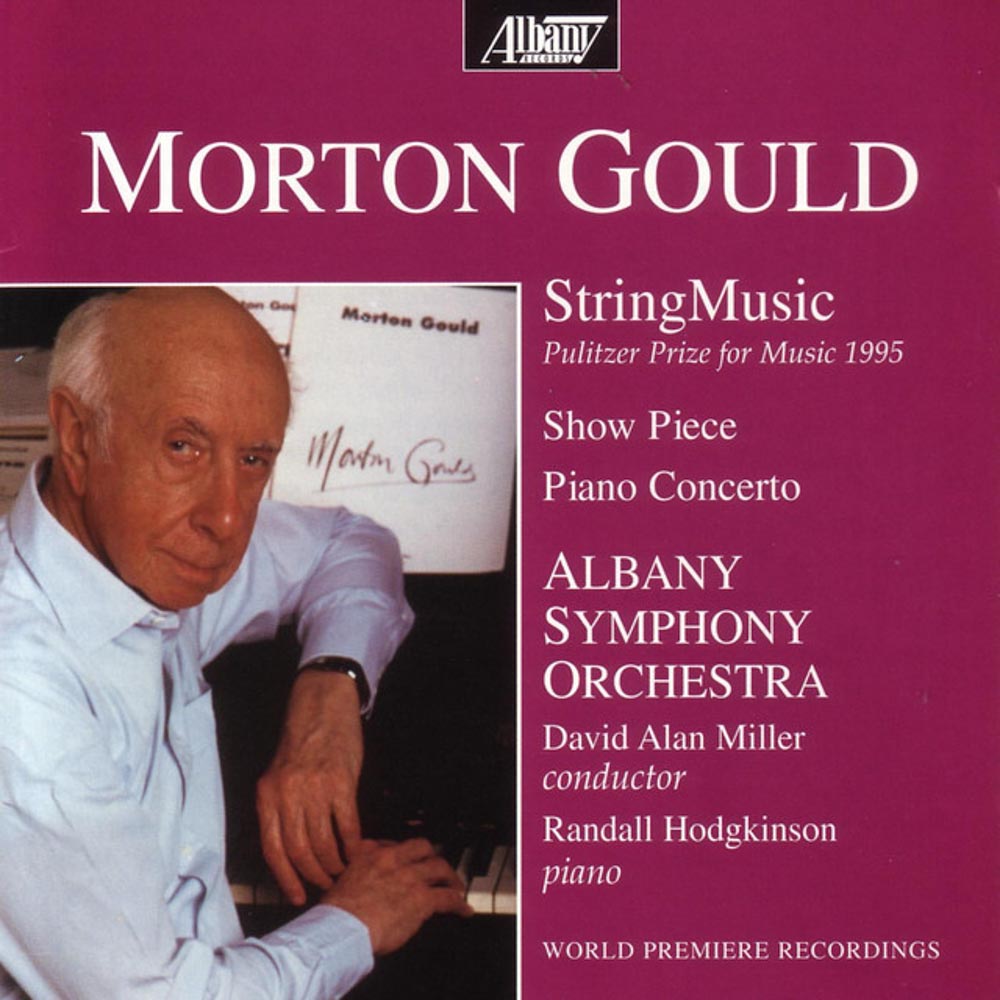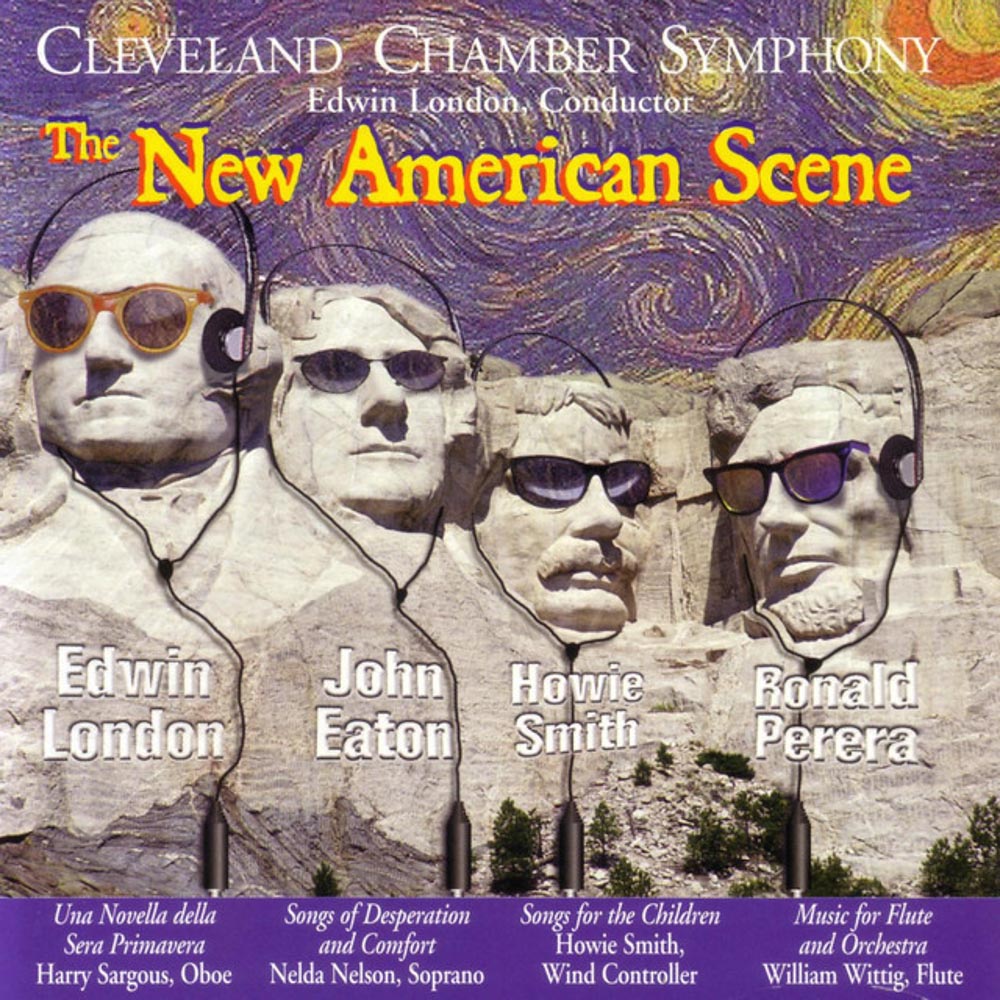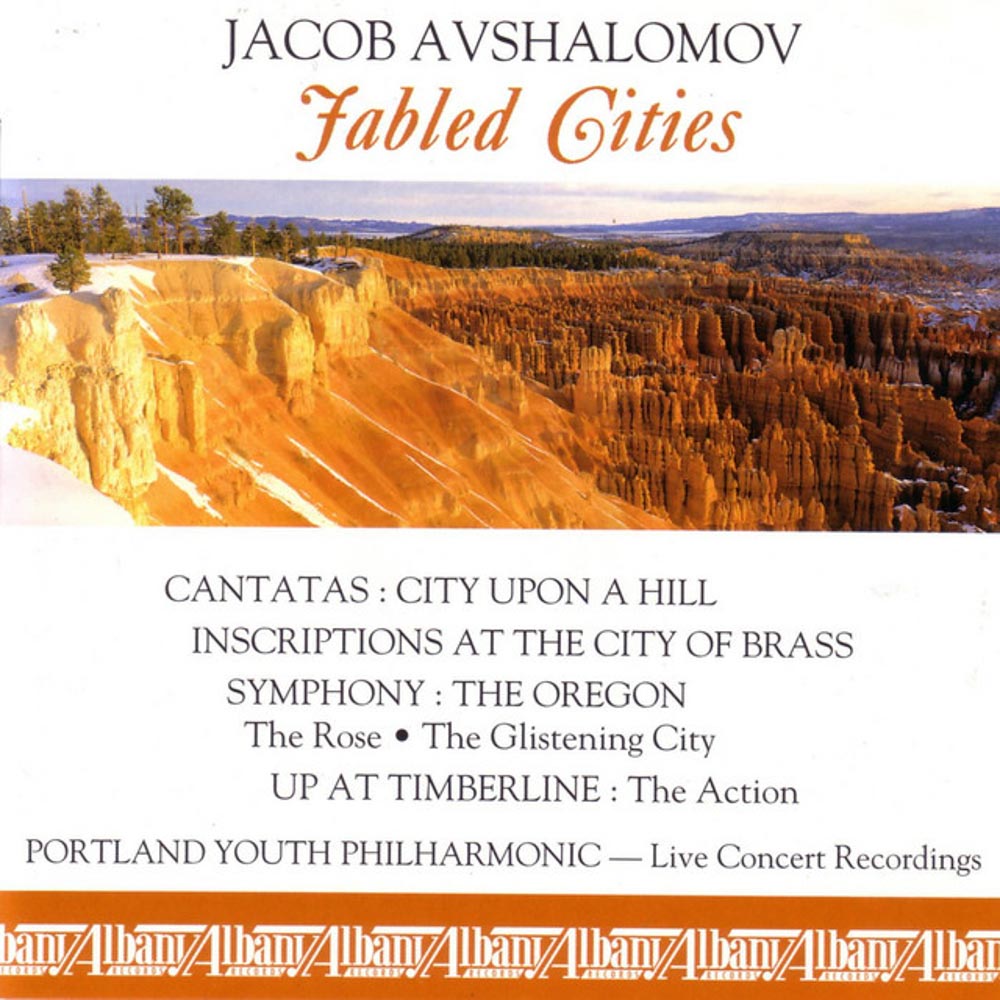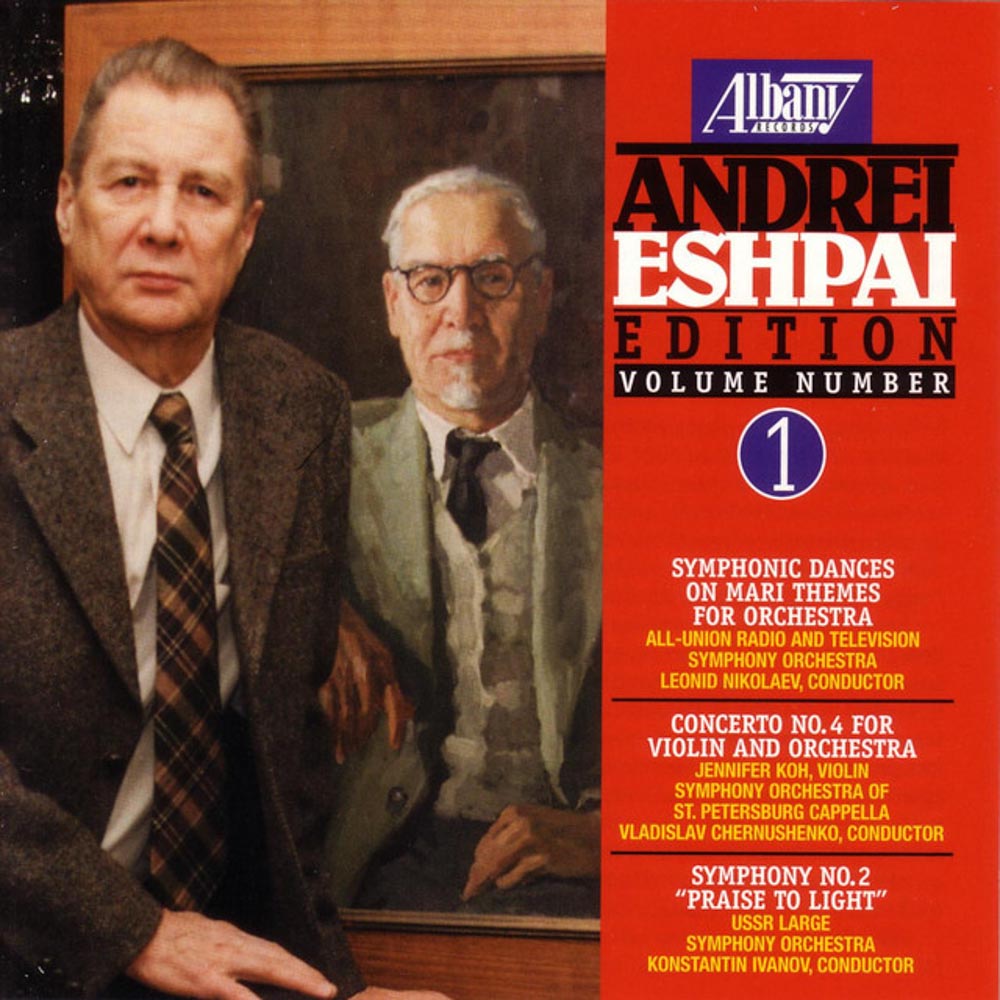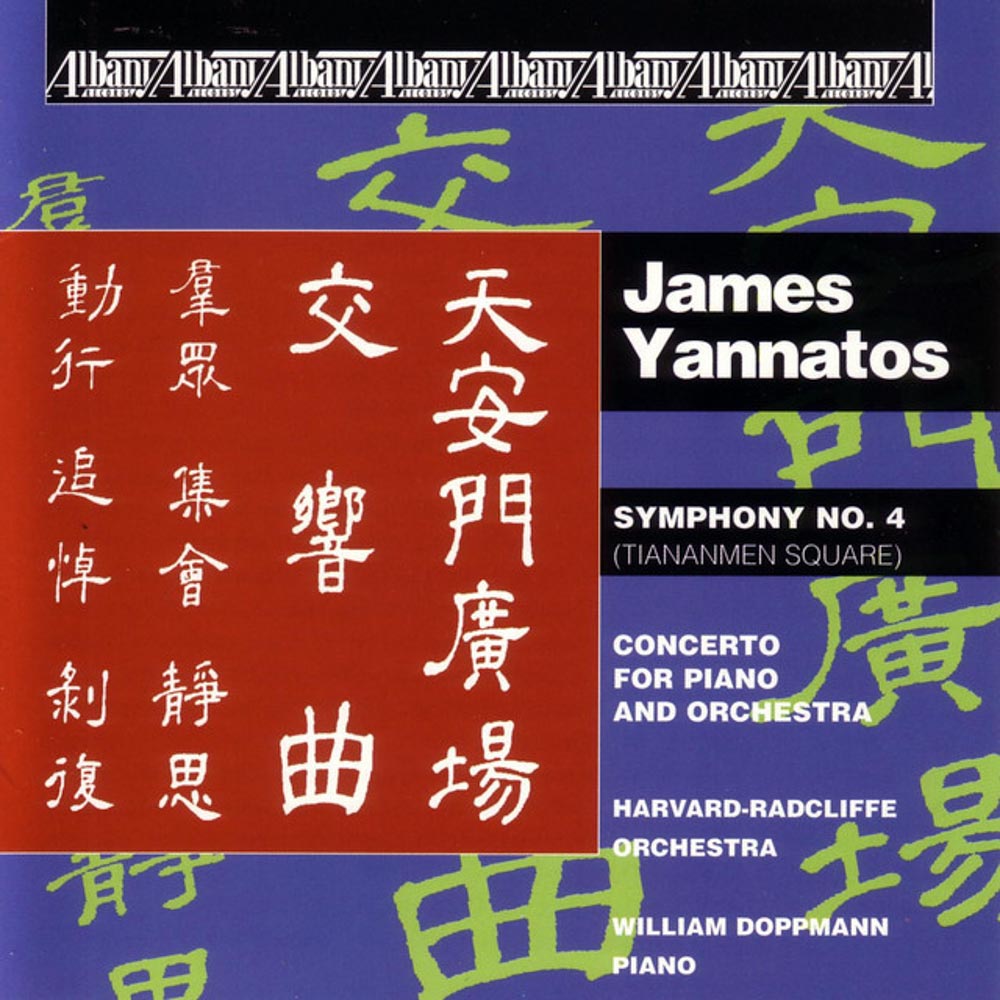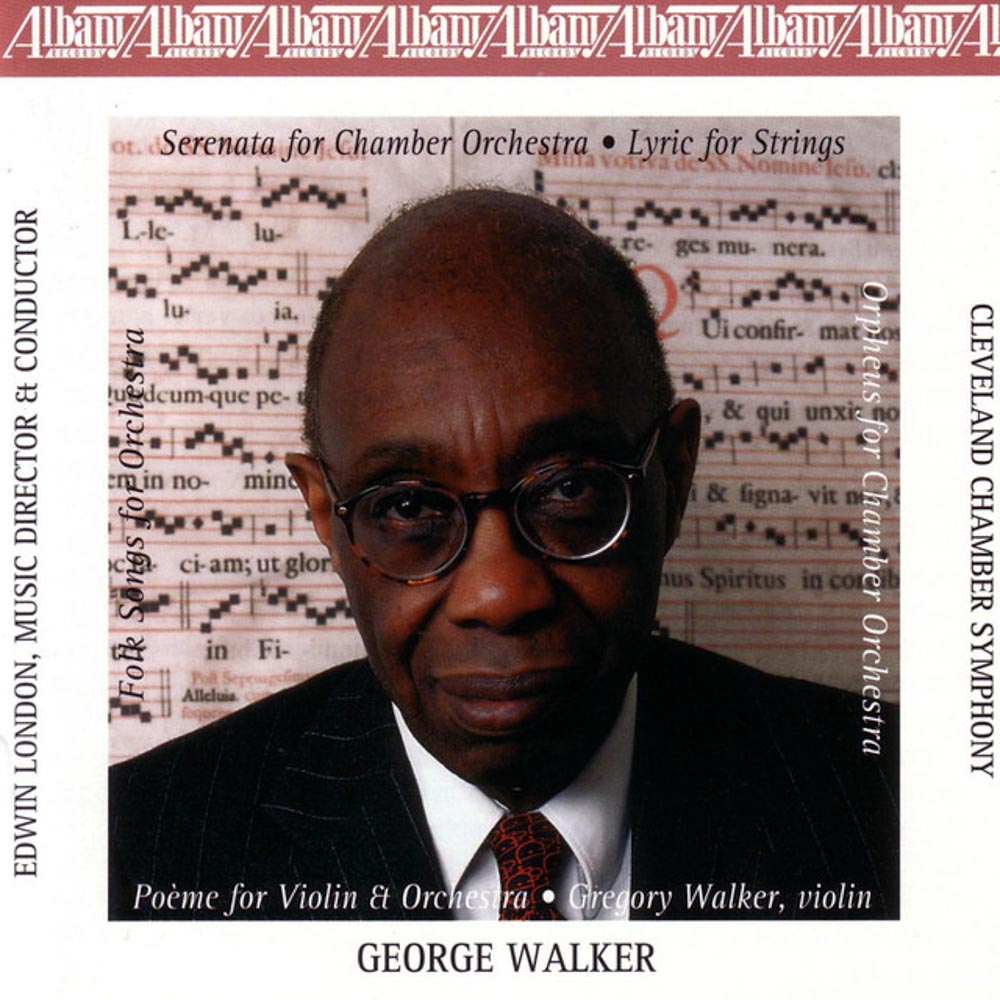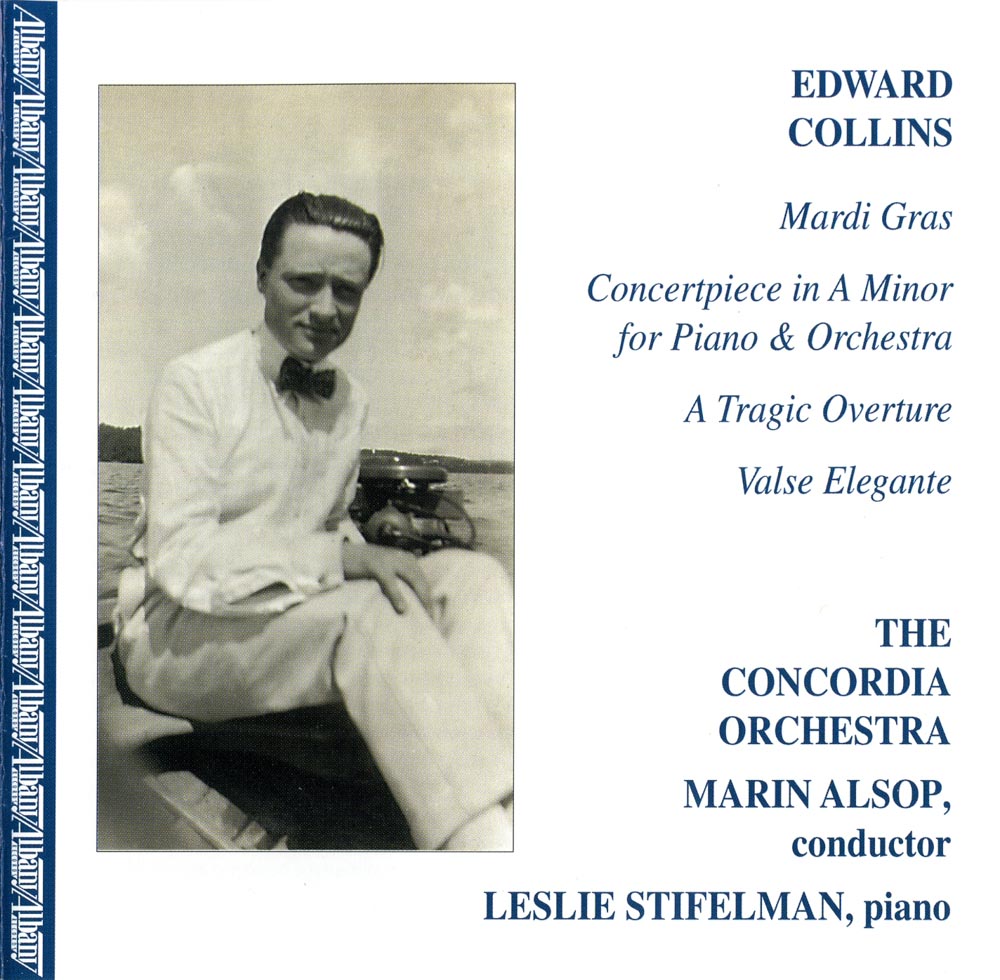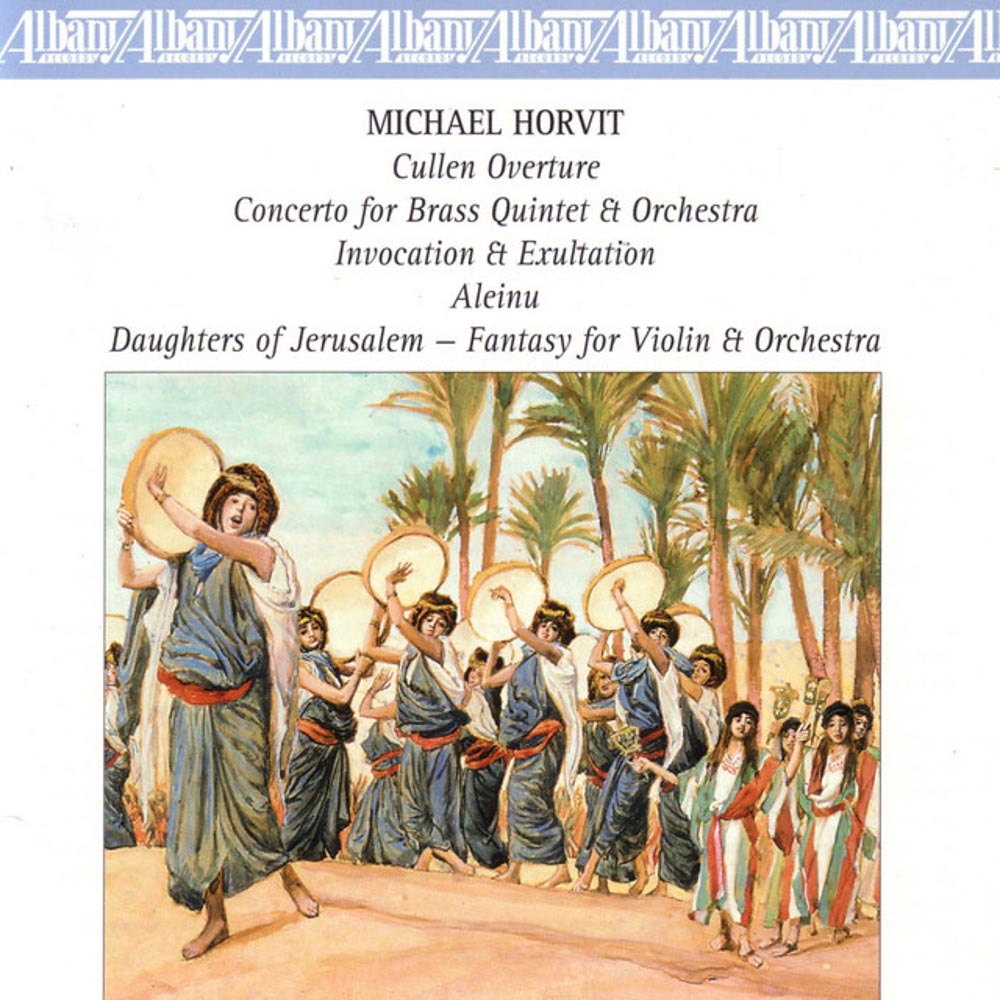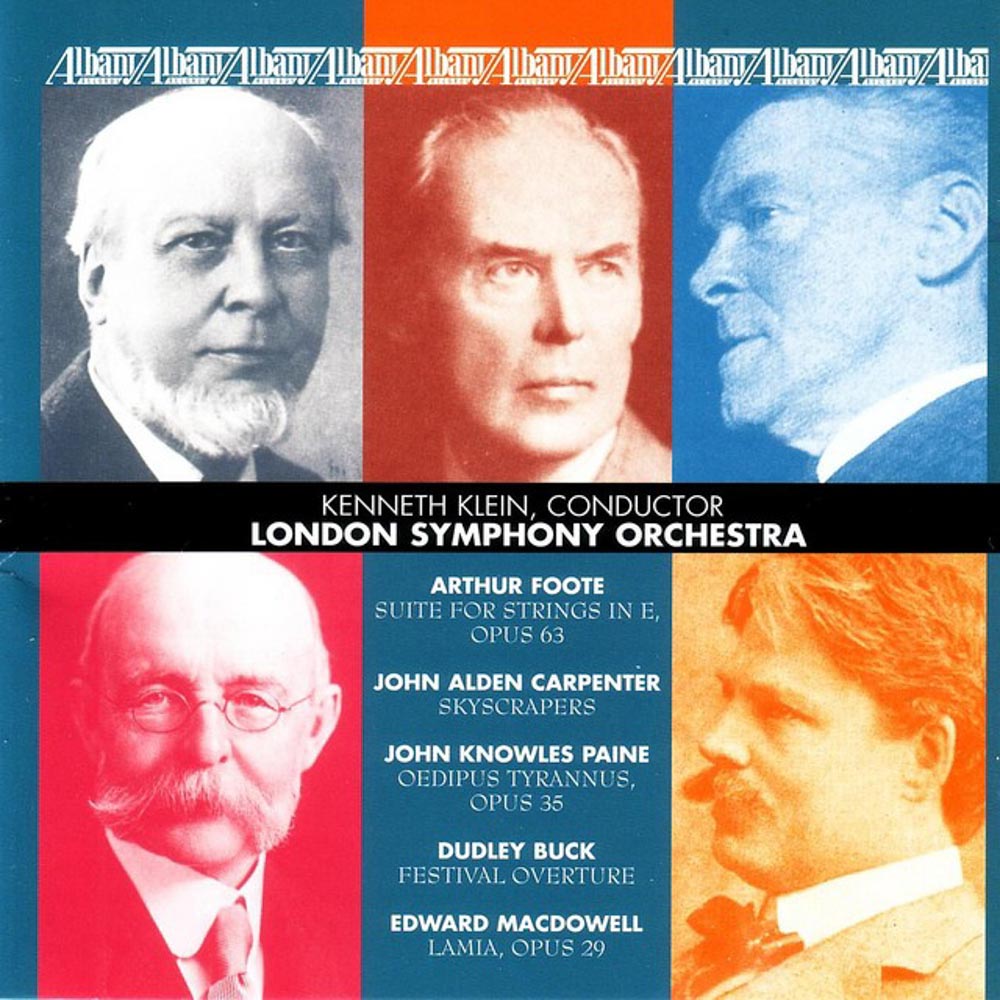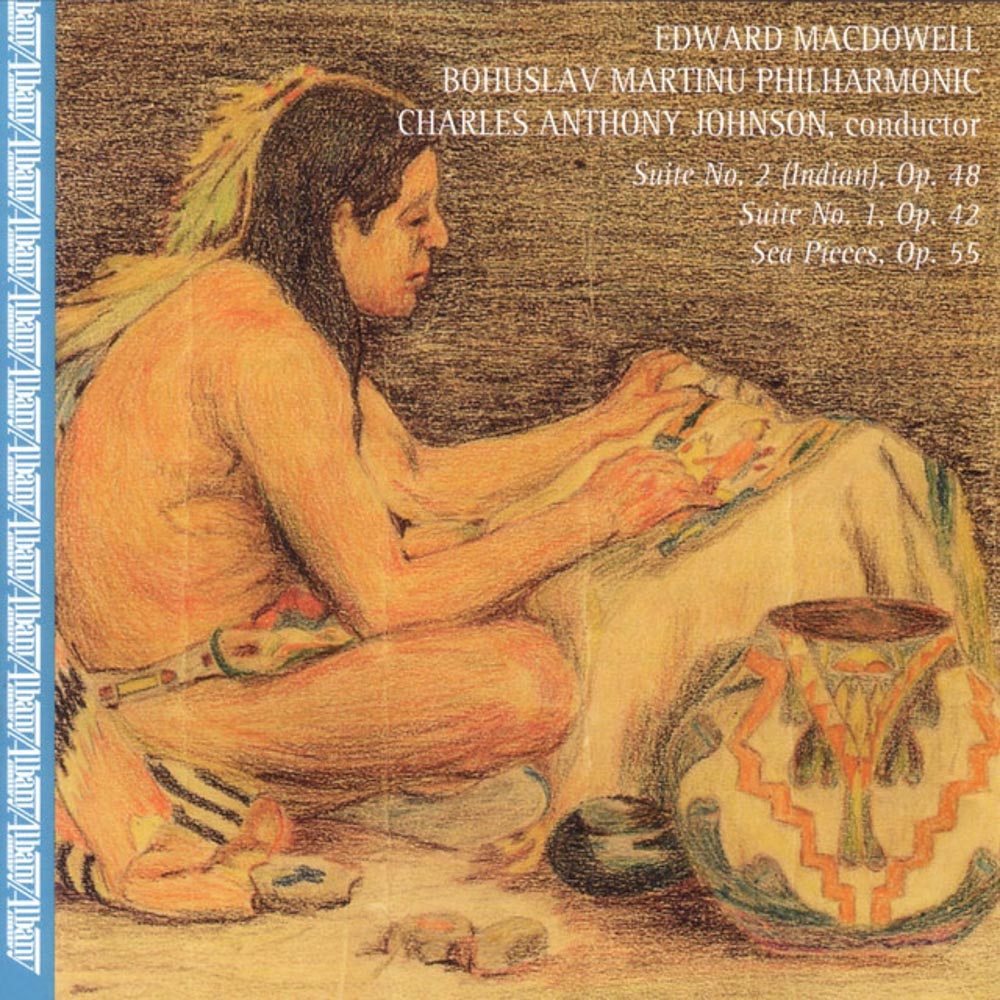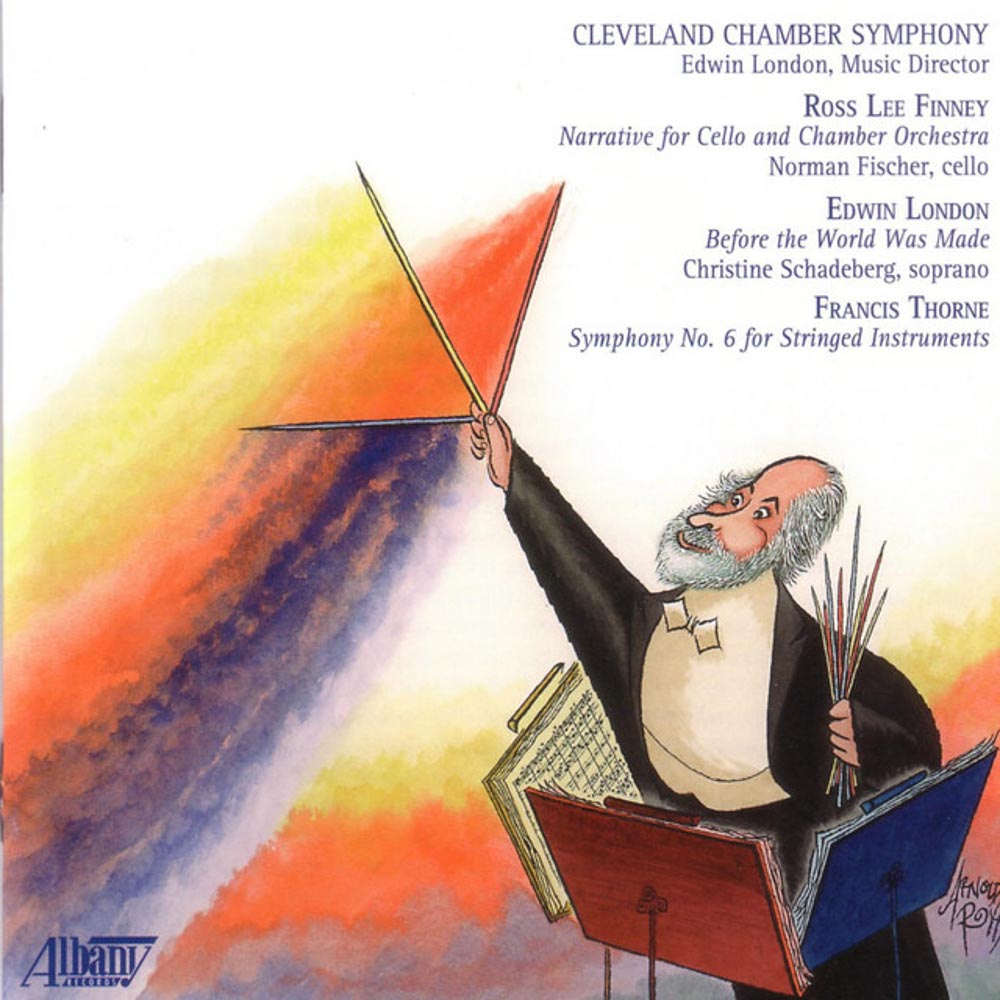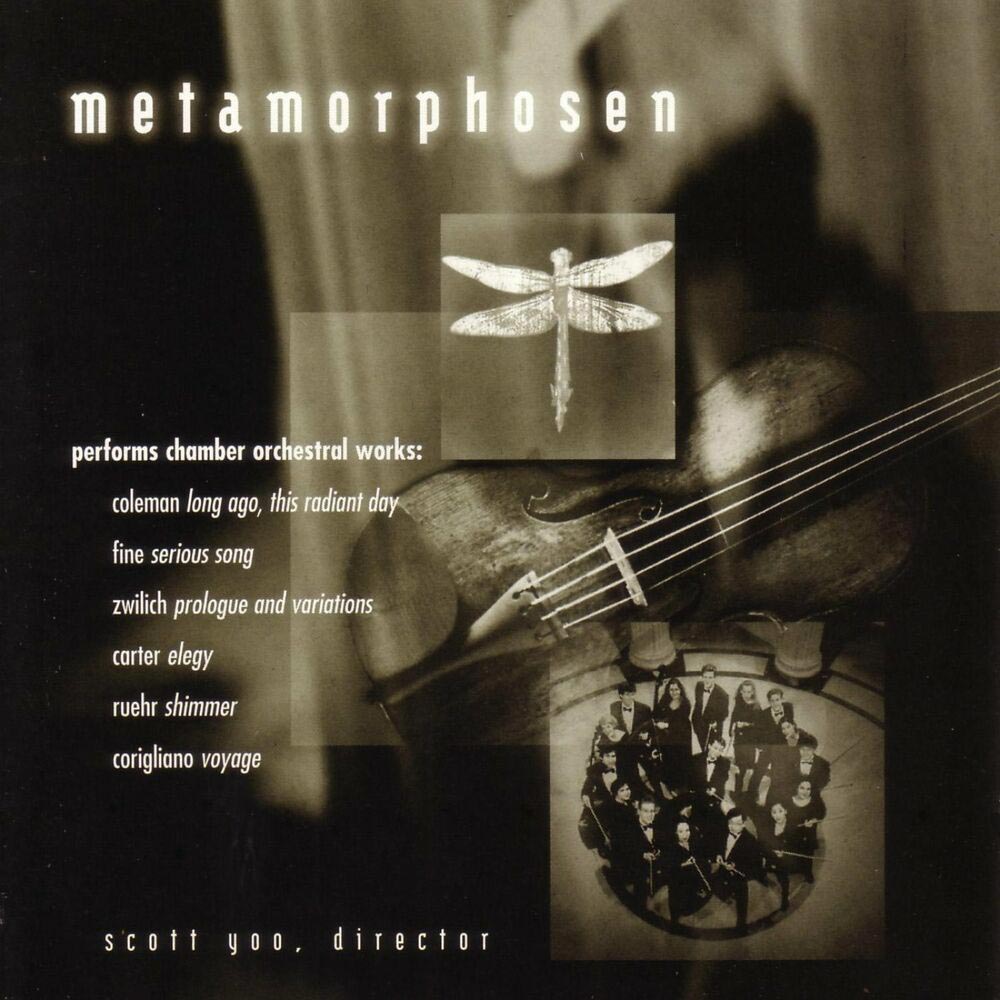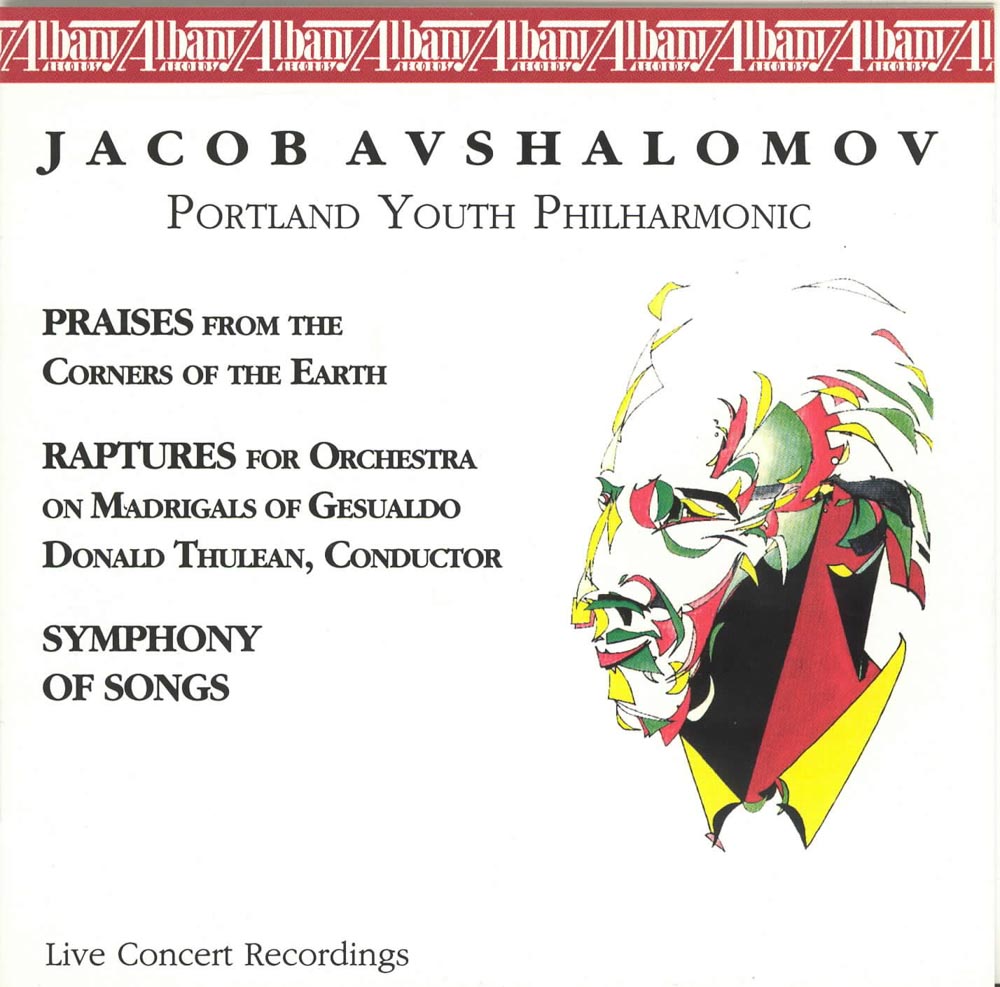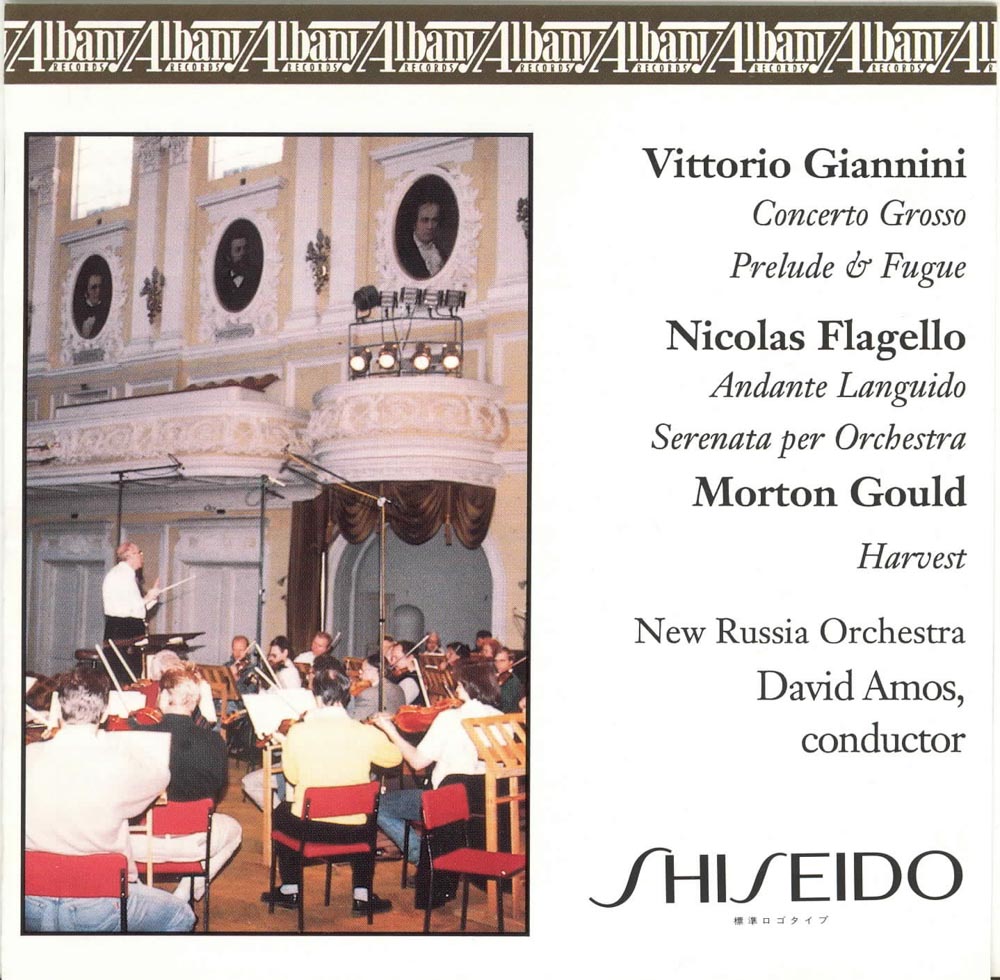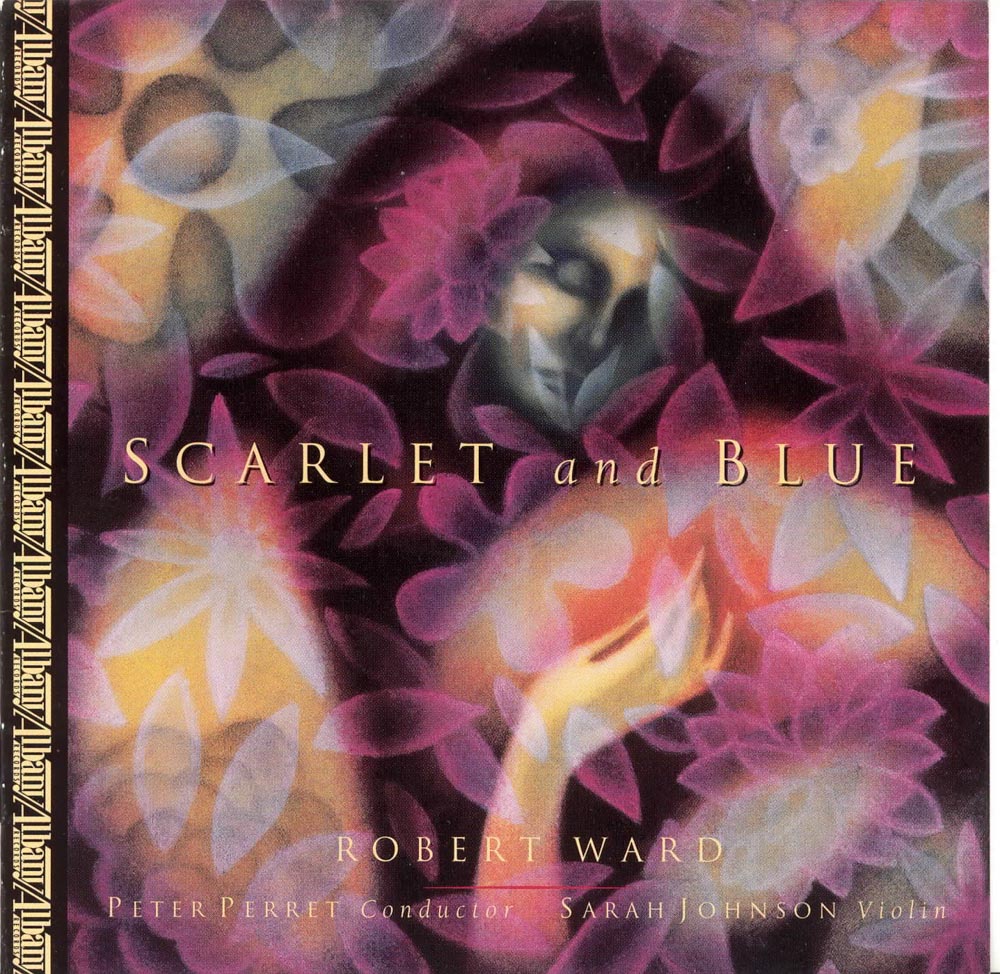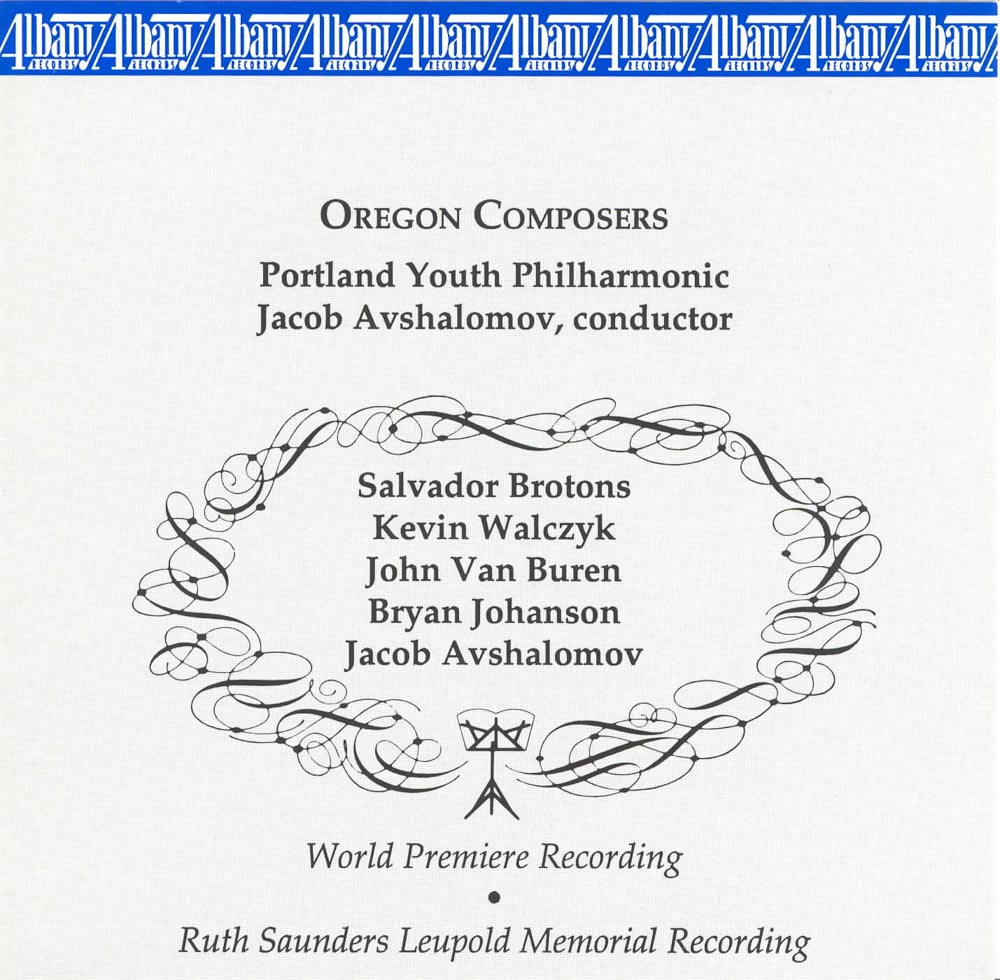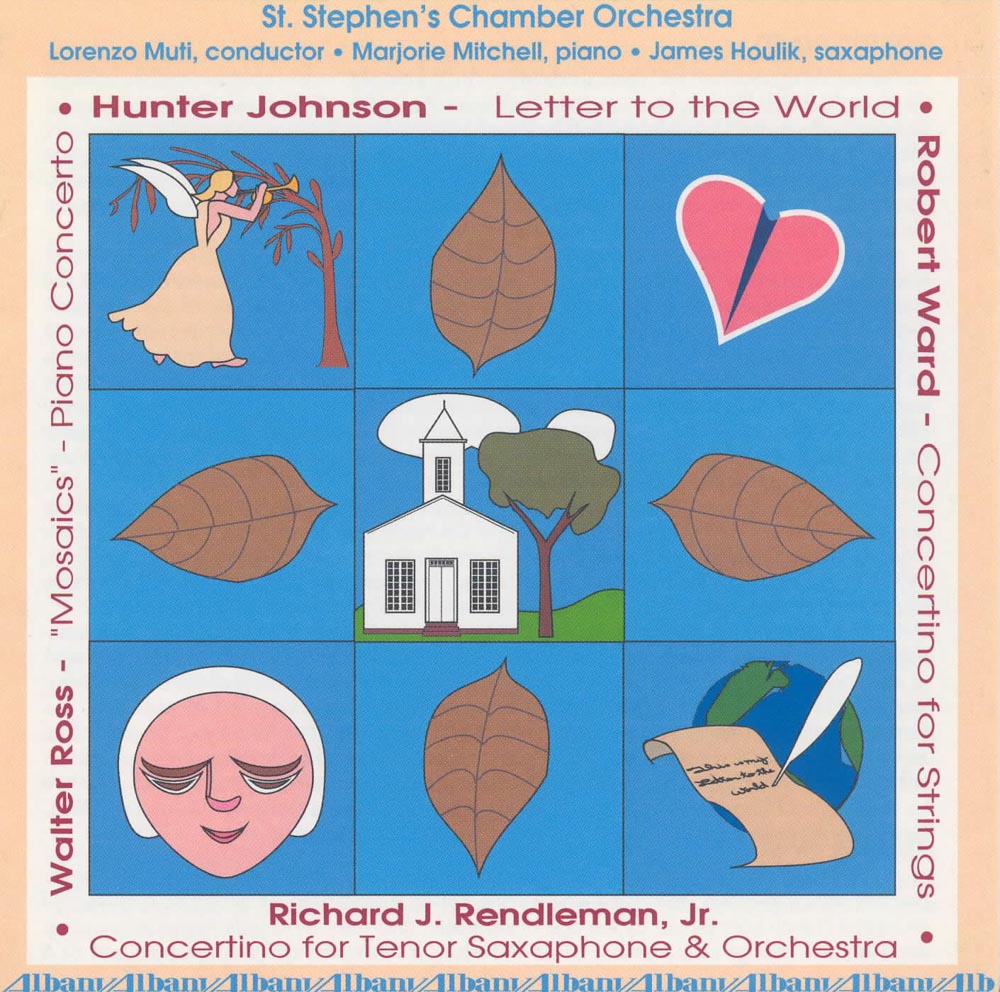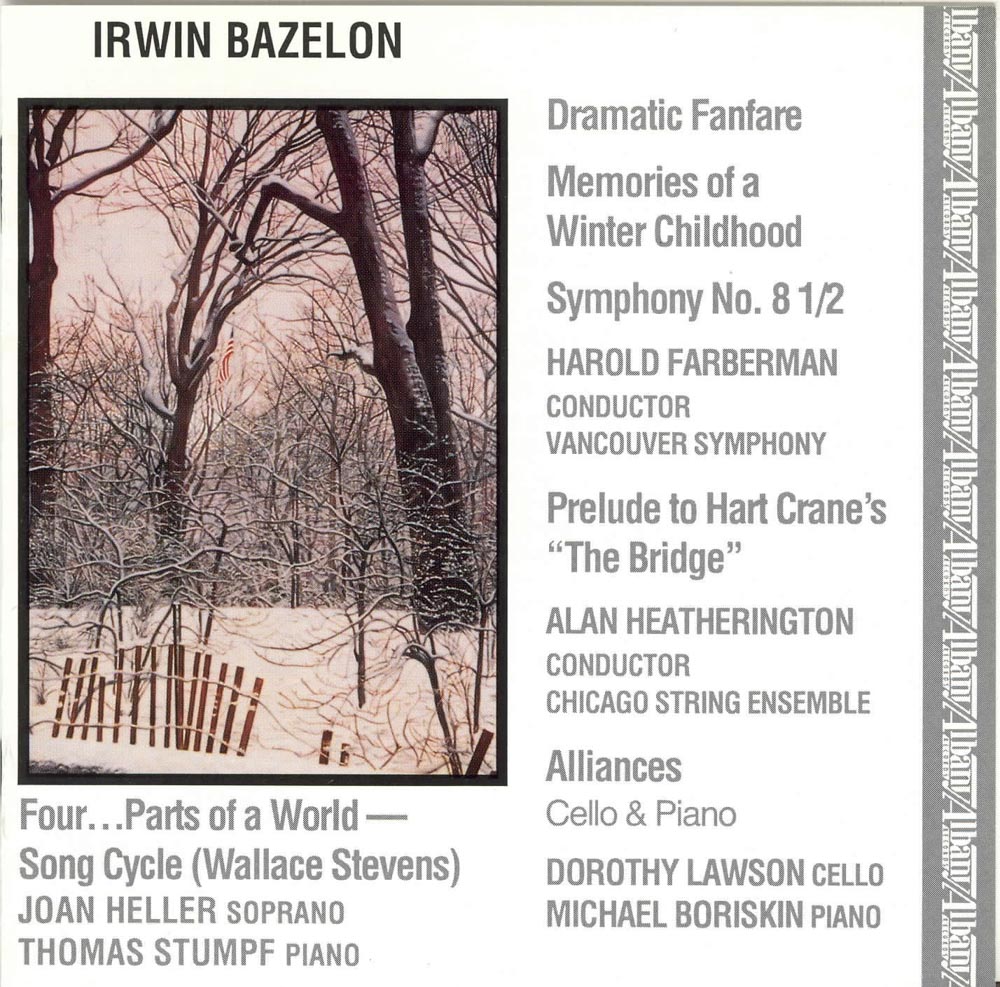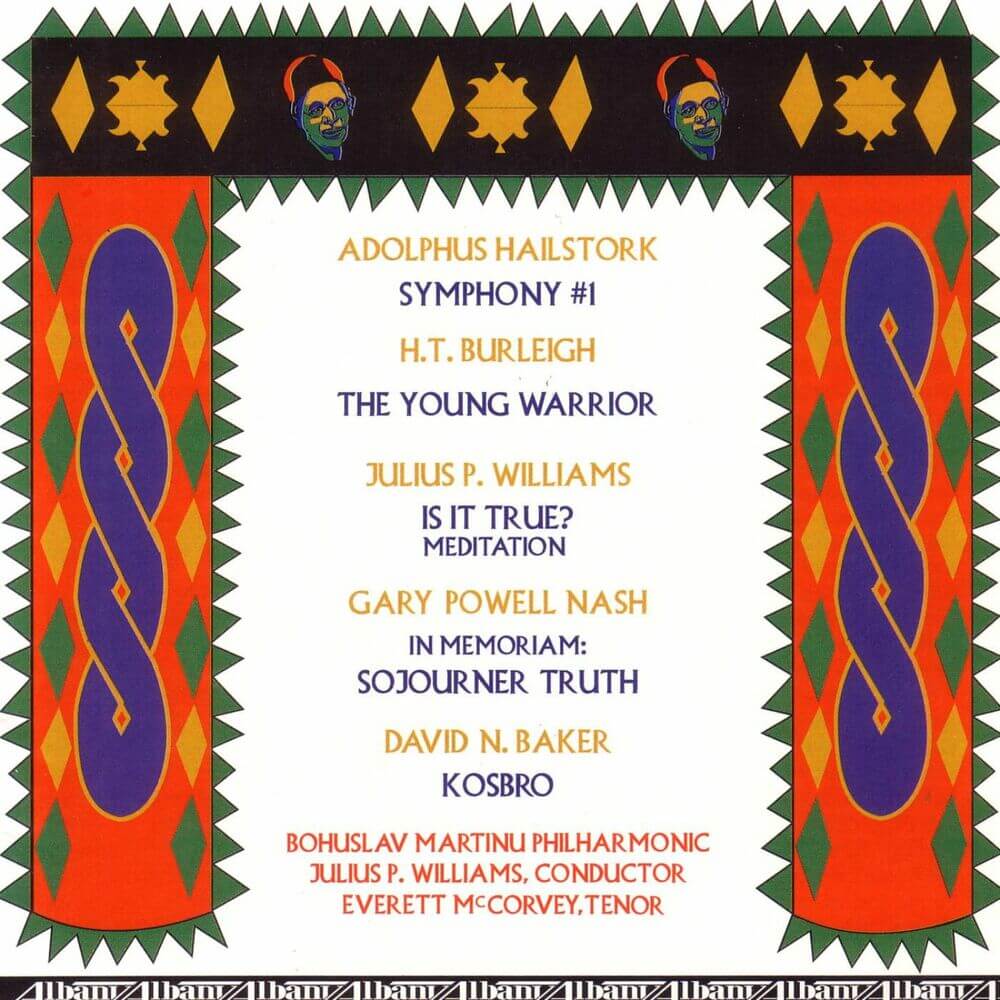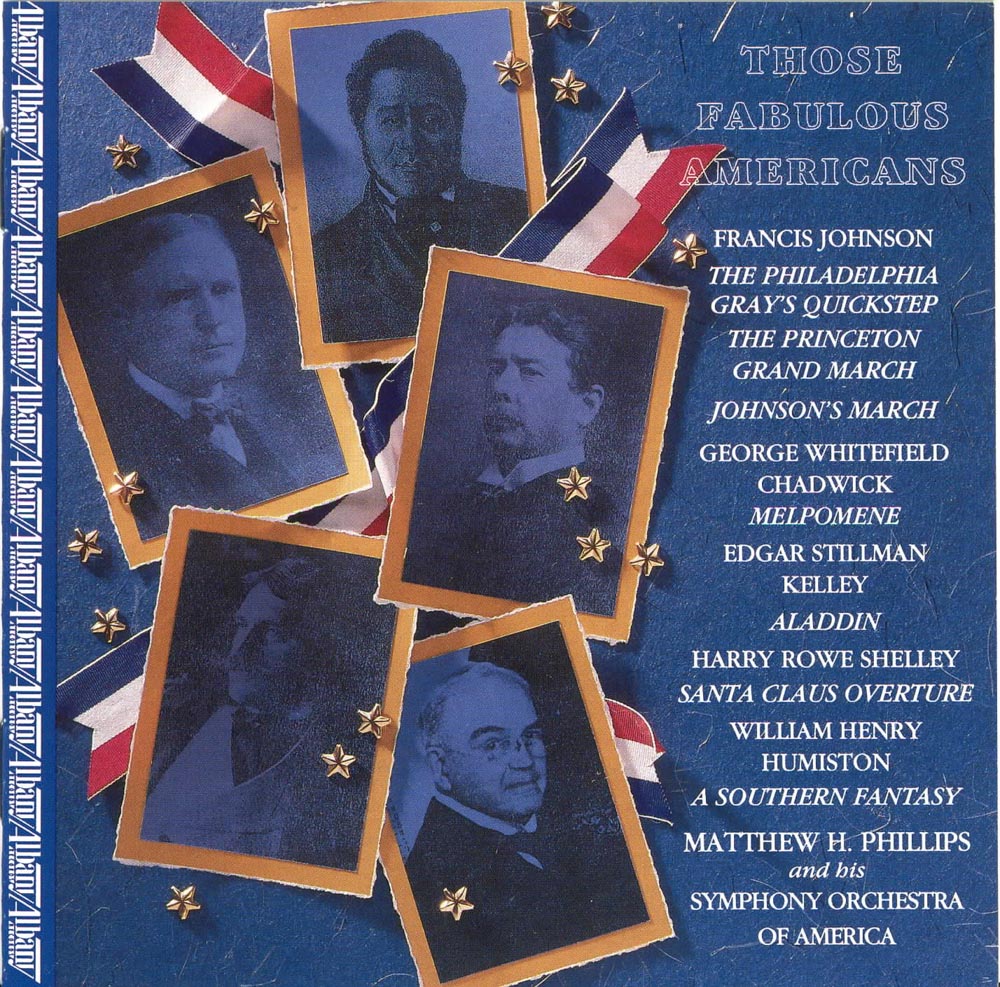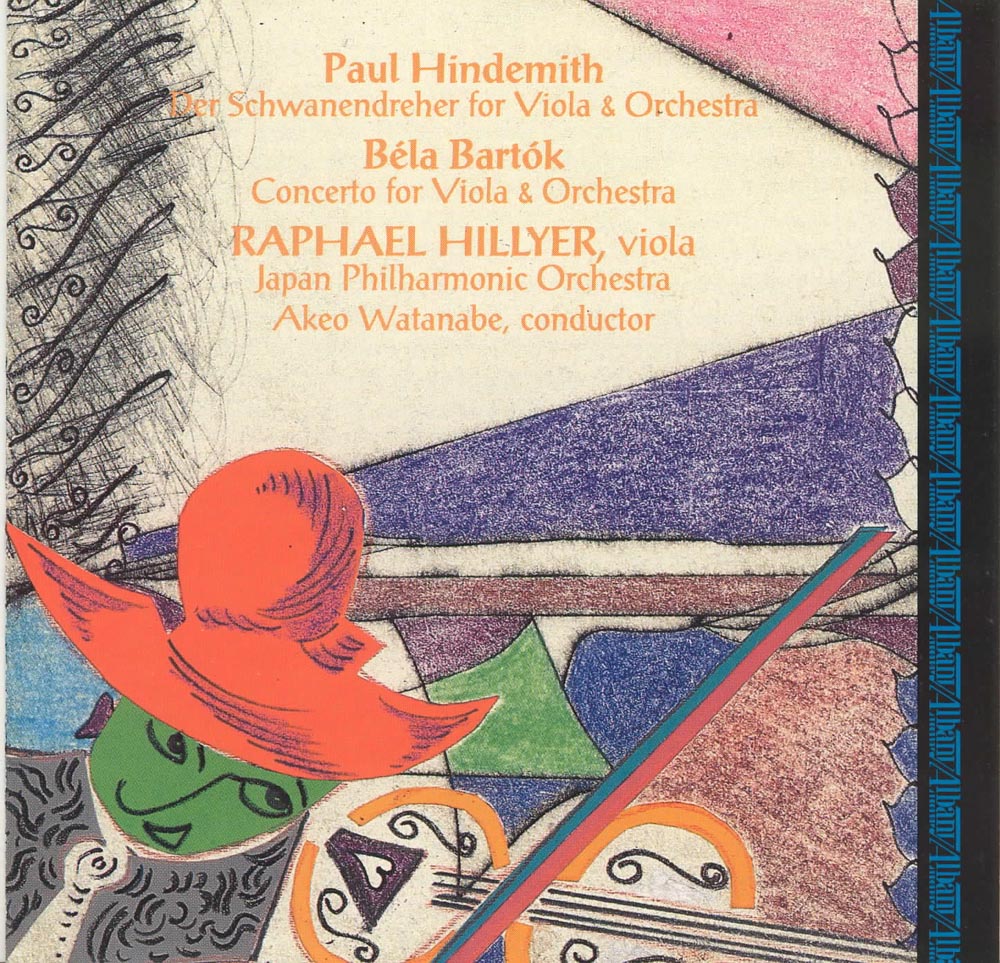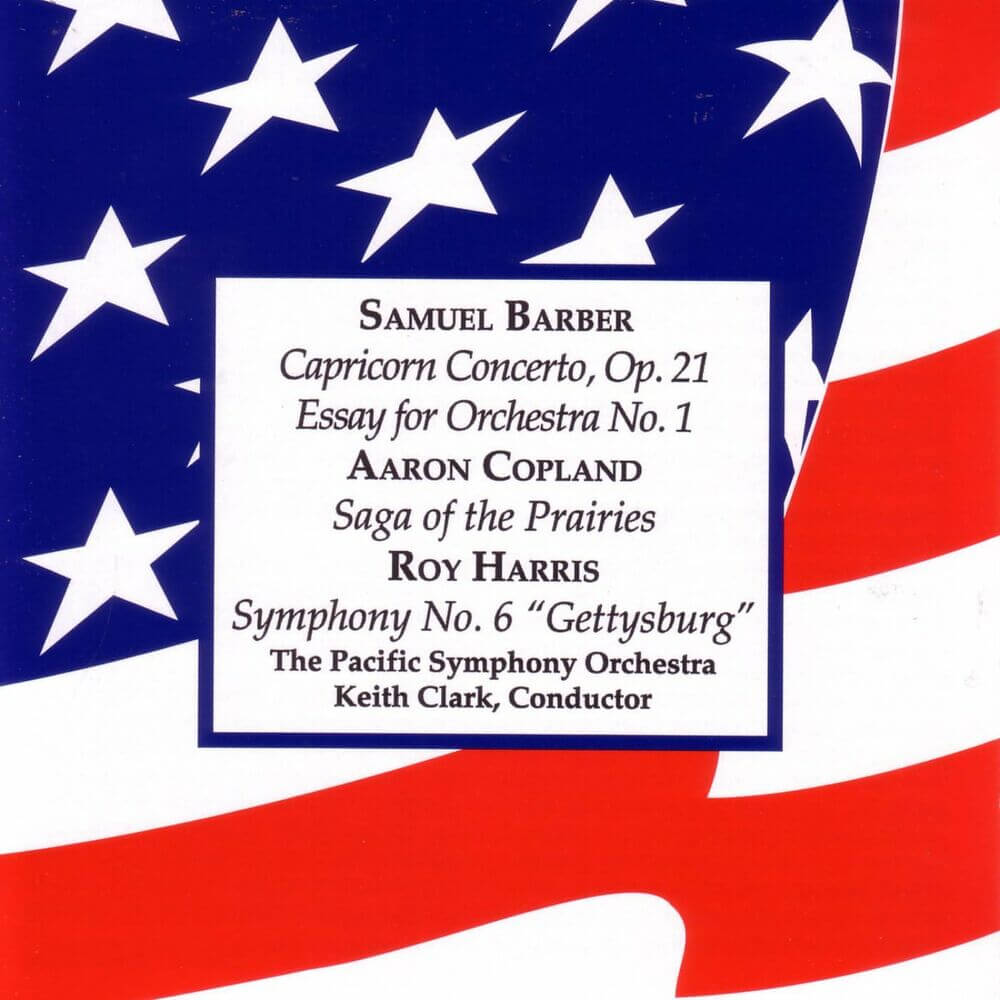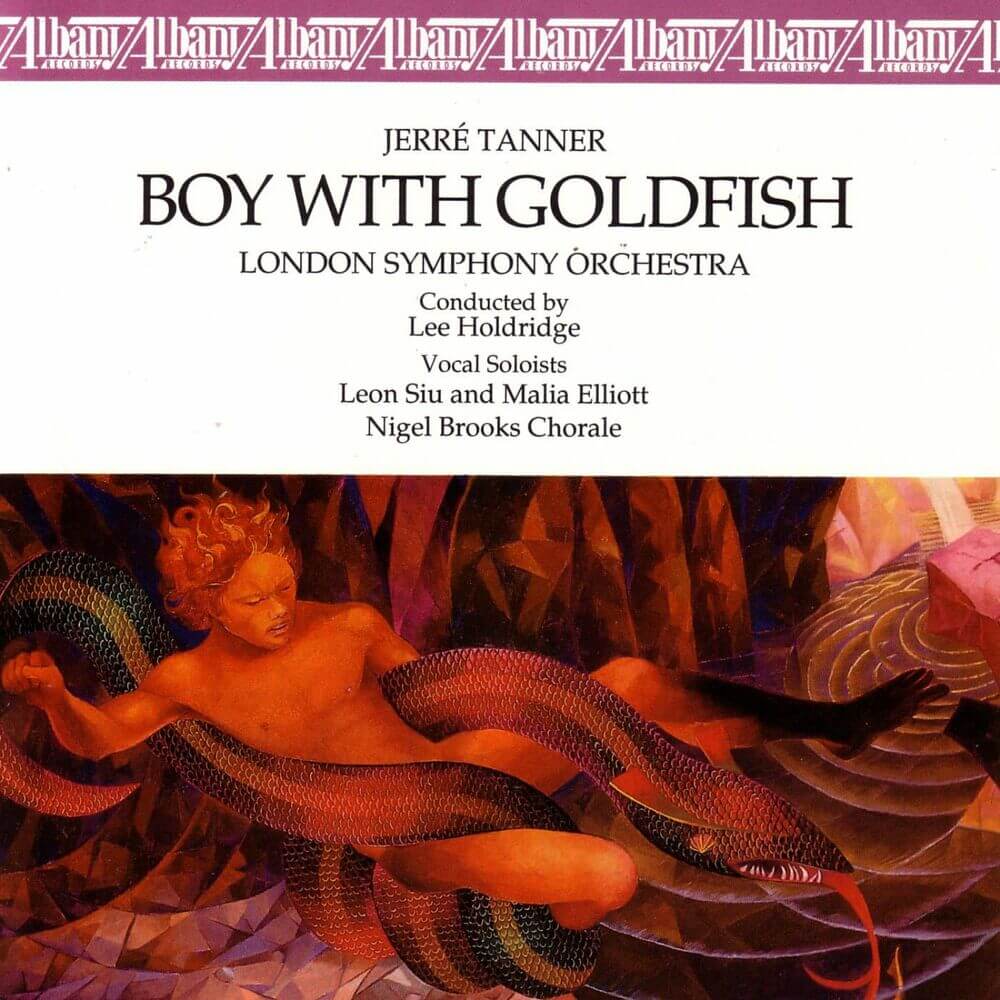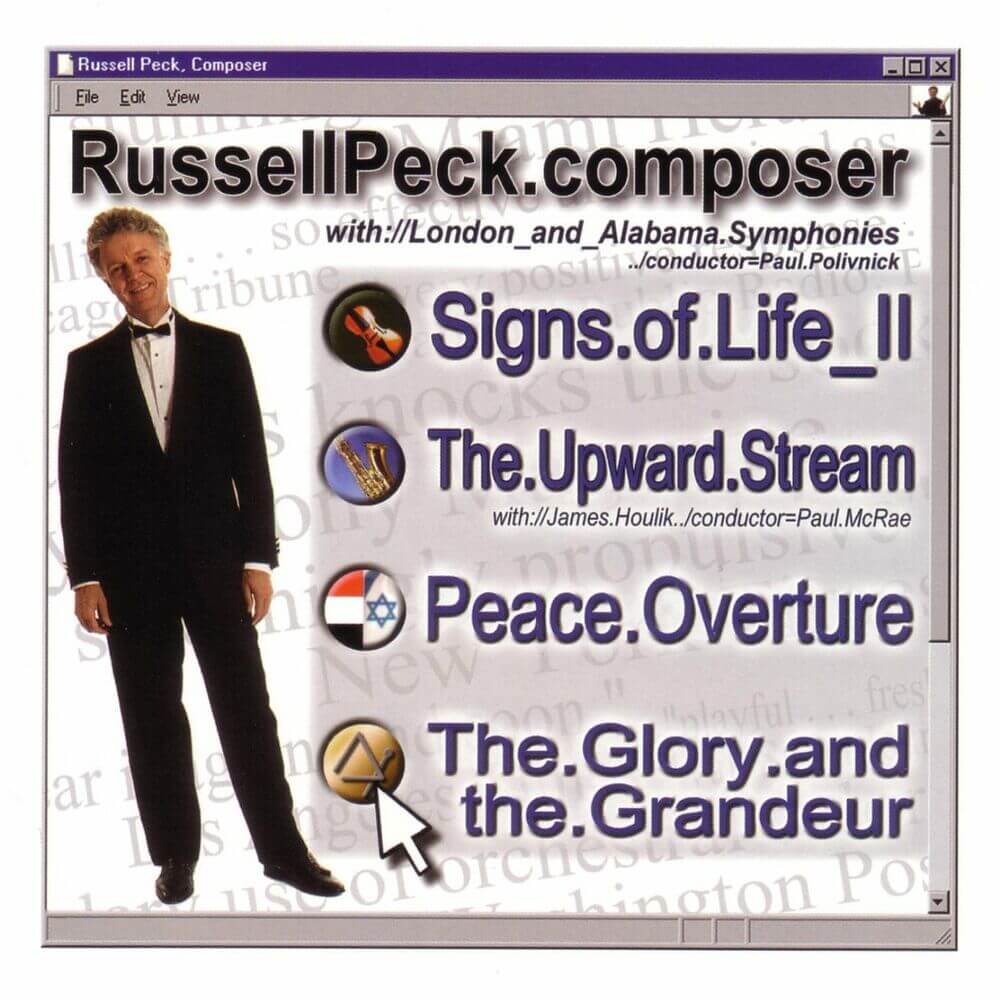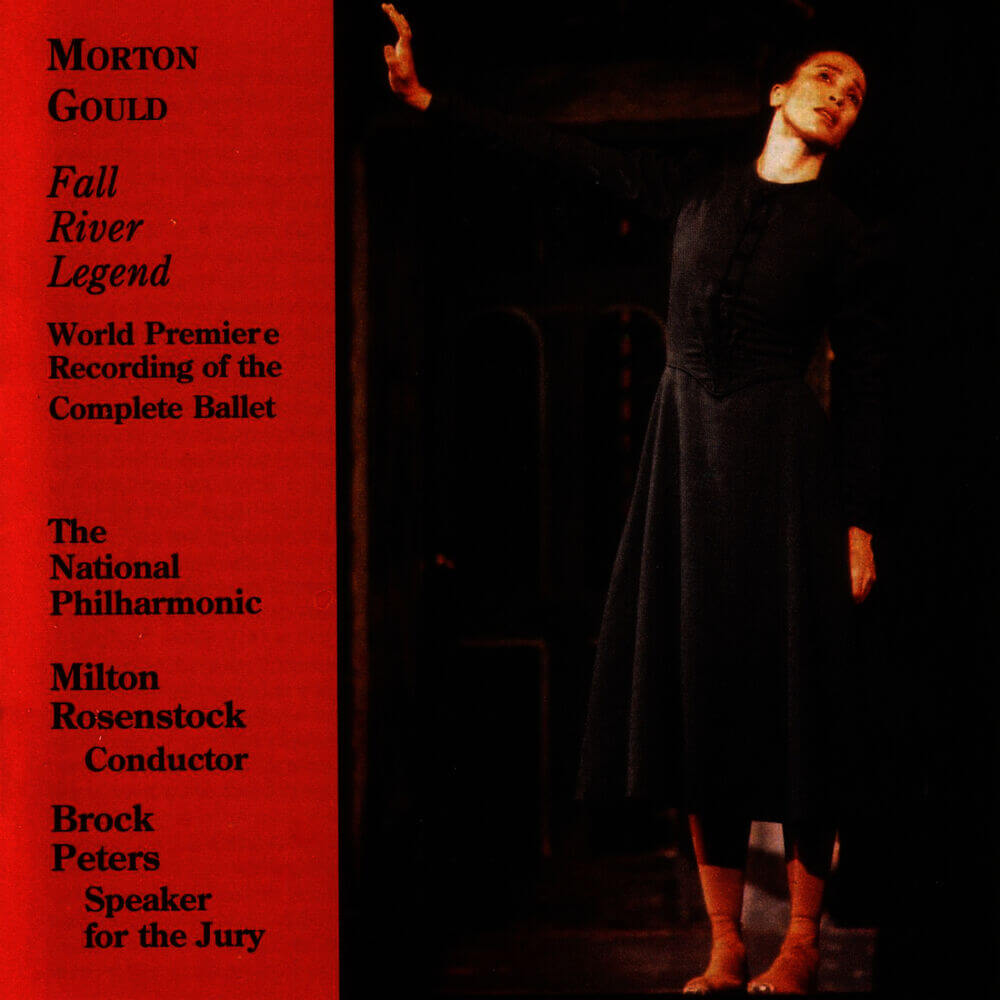Catalog #: TROY0300
Release Date: September 1, 1998OrchestralIt is the intention of this disc to change dramatically music lover’s opinions of the American composer Morton Gould. For those who know him as the composer of “light” music; American Salute, The American Symphonette, The Latin-American Symphonette, or as an arranger of other composer’s music, or just as a fine conductor – get ready. There is no doubt in this listener’s mind that StringMusic ranks with the greatest string music written in this century and yes I am including Elgar, Vaughan-Williams and Britten. In fact StringMusic is a masterpiece, richly deserving of the Pulitzer Prize for music it won in 1995. And the Piano Concerto composed when he was just in his early twenties. Sure, there are hints of Shostakovich, but the music is Gould, right from the start, all Gould. Showpiece was commissioned by Columbia Records. It was intended to show off the modern Orchestra and how well it could be captured in recording with the best of the Columbia engineers’ talent. And while Ormandy and the Philadelphia, for whom the work was written, recorded it, the work was never approved for release. David Alan Miller feels it was because the music is so fiendishly difficult. The Orchestra simply did not have enough rehearsal time. This disc should find a audience because none of the works has ever been available before in any format.
Catalog #: TROY0298
Release Date: September 1, 1998OrchestralRonald Perera is Professor of Music at Smith College. He studied with Leon Kirchner, Randall Thompson and Mario Davidovsky. His Music for Flute and Orchestra was composed for William Wittig who performs it on this disc and who is also the principal flute (since 1970) of the Springfield, Mass. Symphony Orchestra. Howie Smith is a virtuoso saxophonist, composer and jazz musician. As a performer he has worked with everyone from Aretha Franklin and Elvis Presley to Luciano Berio and John Cage. About his Song for the Children he writes: "It is a song for the children of Argentina, El Salvador, Lebanon, Nicaragua, South Africa, and so many other places where they seem to have been forgotten." The work is scored for alto saxophone and WX7 MIDI Wind Controller, strings, 2 DX synthesizers and a pipe Organ. The Italian title of Edwin London's one movement work una novella della sera primavera translates as "A novel of the spring evening." The solo oboe is the central character in the "novel." In a further whimsical program note the composer suggests that his "music novel" might be construed as "the make-believe quintessence of oboe (a rebel dude) coming forward from ashes (a rubble deed!) to meet the challenge offered by anthropomorphic dialectics: vicissitudes in search of a character. A double read? Why not." In The London Financial Times Andrew Porter called John Eaton "the most interesting opera composer writing in America today." Eaton's Songs of Desperation and Comfort were composed during a residency the composer spent in the Villa Serbelloni at Bellagio, Italy. The premiere of this music by the Cleveland Chamber Symphony was the 100th world premiere composition presented by this Organization. It is scored for mezzo-soprano and Chamber Orchestra.
Catalog #: TROY0296
Release Date: September 1, 1998OrchestralCity Upon a Hill and Inscriptions at the City of Brass are both for Chorus and Orchestra. City Upon a Hill was commissioned by the Boston Winterfest of 1965 where it received a terrible performance. Ten years later during the Bicentennial celebrations it was performed with the Portland Youth Orchestra and the Governor of Oregon as the speaker. The reviewer for the Portland Oregonian called it a work of "moving beauty." Inscriptions At the City of Brass was premiered by the Schola Cantorum of New York under Hugh Ross, at the Metropolitan Museum of Art in 1957, with Vera Zorina as Sheherezad. Avshalomov began work on his Symphony: The Oregon in Portland in 1960 and it was completed there in 1962. Between these dates much of the music was written in Munich where the composer was on sabbatical. The premiere was given by the Portland Youth Symphony. On this disc we hear only the third and fourth movements. Up at Timberline has an unusual history. It was commissioned by the Friends of Timberline to note the Lodge's 50th anniversary. Situated on the slopes of magnificent Mt. Hood, the Lodge is one of the most enduring projects of the WPA (Works Progress Administration). It was dedicated in 1937 by President Roosevelt. It was premiered in 1987 at the Lodge.
Catalog #: TROY0286
Release Date: May 1, 1998OrchestralYou are probably thinking, with the reputation of Albany Records for American music and composers, what are we doing introducing a series of recordings devoted to the music of Andrei Eshpai? The answer is simple. For the same reason we have so much of the English composer George Lloyd's music in our catalogue. He is a good composer who is under-represented in the catalogue as a whole. In short, we think his music is terrific and will appeal to a large audience if only they have a chance to hear it. So we are going to give you the chance. Besides, as with George Lloyd, here in Albany, we have had a special relationship with Mr. Eshpai. In February 1992, he was here in Albany when the Albany Symphony Orchestra performed his Concerto For Orchestra. From that time on, we have maintained close contact so much so that the master tapes from which this series of recordings will be drawn have been supplied to us directly by the Eshpai family. So, there will be many treasures to come. Andre Eshpai was born on May 15, 1925 in the ancient city of Kozmodemynsk on the Volga River in the autonomous republic of Mari of the RSFSR. His father, Yakov Andreevich Eshpai (1890-1963), was one of Mari's first professional composers. He was also a choral conductor, folklorist and educator. He composed the first Mari instrumental works, collected the folksongs of his region, and for many years was on the faculty of the Mari National Institute of Language, Literature and History in Ioshkar-Ola (the capital of the Mari Republic). The Eshpai home was a gathering place for many creative individuals - musicians, artists, writers and other intellectuals. It was in this enriching environment that Andrei grew up. In 1928 the family moved to Moscow where his father attended the Conservatory and his mother the Moscow Pedagogical Institute. Soon young Andrei began taking music lessons as well. He studied at Gnessin from 1934 to 1941. He served in the Soviet Army from 1943-1946. When he got out, he returned to the Moscow Conservatory where he studied the piano and composition with Miaskovsky and Orchestration with Nicolai Rakov. He graduated in 1953 and then entered the post graduate program with Aram Khachaturian. Today, he is the President of the Russian Author's Society (the equivalent of our ASCAP or BMI). The music of this fine composer should have a wide appeal.
Catalog #: TROY0278
Release Date: March 1, 1998OrchestralIn the January-February 1998 issue of Fanfare, John Story writing about Yannatos' Trinity Mass said: "Trinity Mass is possibly a masterpiece worthy to stand comparison with such other 20th-century milestones as Britten's War Requiem, Tippet's A Child of Our Time and The Mask of Time, Penderecki's St. Luke's Passion, or Nono's Prometeo. The two works on this disc are the equal to the Trinity Mass, if not easier to enjoy because they are Orchestral works and the performances by both the Orchestra and the pianist are first-rate. The performers, under the composer's direction, play as well as any in this unfamiliar music. In 1988, William Doppmann asked Yannatos to write a piano concerto for him. He asked that it be a substantial piece which would show off the piano in various ways. Yannatos writes: "I started to think of ways to approach this formidable task in the summer of 1992, started to compose the work in the fall of 1992, and finished it in the spring of 1993, completing the Orchestration that summer. My own guidelines included writing a piece that linked the past to the present, musically and pianistically, presented both piano and Orchestra in a mutually dependent partnership and played with the notion of transformation and renewal in the cycles of the seasons and in the linkage and development of musical ideas." About his Symphony No. 4, Yannatos writes: "I was transfixed by events in Tiananmen Square - excited by the students' quest for greater freedom and appalled by the brutal response by the government. As a musician, I felt compelled to speak out the only way I could. I spent the summer of 1989 immersed in the rhythms and cadences of Chinese folk tunes from a collection by Yuen Ren Chao given to me by his daughter, Rulan Chao Pian, my colleague in the music department. Elements of these tunes were chosen to serve as my musical materials for the six-movement symphony I planned to write. Sketches were made that summer and the work was completed and Orchestrated by January 1990."
Catalog #: TROY0270
Release Date: January 1, 1998OrchestralThe Pulitzer Prize winning composer, George Walker, composed his Serenata for Chamber Orchestra for the Michigan Chamber Orchestra. It received its premiere in Detroit in October 1983. It received another performance by the New York Philharmonic in July 1984 on a Horizon's 94 concert. The Lyric for Strings was composed in 1946 and premiered that year by the student Orchestra of the Curtis Institute of Music conducted by Seymour Lipkin in a radio concert. It received another performance the following year by Richard Bales and the National Gallery Orchestra. The Poeme for Violin and Orchestra was premiered by the St. Paul Chamber Orchestra with Cho-Liang Lin as violin soloist in 1991. It is a revised version of an earlier Violin Concerto. Orpheus for Chamber Orchestra was commissioned by the Cleveland Chamber Orchestra and was completed in 1994. It received its premiere in March 1995. Besides the Chamber Orchestra, it includes a part for narrator and singer. The Folk Songs for Orchestra were completed in the fall of 1990 and was premiered in May 1992 by the Baltimore Symphony under David Zinman. The composer describes his intention as "to set these melodies in an interesting way, in a respectful Orchestral manner. They are wonderful melodies. Four spirituals are quoted intact."
Catalog #: TROY0267
Release Date: November 1, 1997OrchestralIt is an honor for Albany Records to introduce you to the music of the disgracefully neglected American composer, Edward Collins. During the first part of the 20th century, when American music was struggling to find a distinctive voice and a place on concert programs, Chicago composers were blessed with a nurturing champion in the person of Frederick Stock, the second conductor of the Chicago Symphony Orchestra. Among the gifted musicians who would benefit from Stock's fatherly care was Edward Joseph Collins. Between 1924 and 1943 his music was often heard at Chicago Symphony concerts with the composer himself appearing as soloist in his piano concerti or as guest conductor of his various Orchestral compositions. He was born in Joliet, Illinois to Irish-American parents. The youngest of eight musically talented brothers and sisters, he was giving piano recitals at the age of nine and at 14 became a pupil of the renowned pianist Rudolph Ganz. When Ganz moved to Berlin, Collins accompanied him where he studied with Max Bruch and Engelbert Humperdinck. He made his European debut in 1912 and in the fall returned to America, touring on a double bill with the great soprano Ernestine Schumann-Heink (Collins's sister, Kate Hoffman, was Schumann-Heink's accompanist for 35 years). As a result of the tour, Collins was engaged as the assistant conductor of the Century Opera Company in New York. In 1914, he became an assistant conductor at the Bayreuth Festival in Germany. During World War I, Collins served as a Lieutenant for the 88th Division in France. He entertained troops not only by performing but also by composing an operetta "Who Can Tell?" which General Pershing and President Wilson attended on opening night. After the Armistice, he returned to the concert stage. In 1919 he joined the faculty of the Chicago Musical College. In 1933 he moved his studio to the American Conservatory of Music and remained on their faculty until his untimely death in 1951. It is wonderful that we have musicians of the caliber of Marin Alsop and her great Orchestra giving Edward Collins's music the attention it deserves. Here is the music of a wonderful composer.
Catalog #: TROY0265
Release Date: November 1, 1997OrchestralMichael Horvit is a Professor at the University of Houston Moores School of Music, where he has headed the Theory and Composition Department since 1967. For 25 years he served as Music Director at Congregation Emanu El, Houston. During his studies at Yale University, Tanglewood, Harvard and Boston University, his composition teachers were Aaron Copland, Lukas Foss, Walter Piston, Quincy Porter and Gardner Read. The Cullen Overture was commissioned by the University of Houston for the rededication of the Cullen Performance Hall in October 1988. The Concerto for Brass and Orchestra was commissioned by Richard Frazier for the Chicago Chamber Brass. The Invocation and Exultation was commissioned by the Missouri Unit of the American String Teachers Association in commemoration of the 200th anniversary of Mozart's death and was premiered in January, 1991. There are several references to Mozart's music in the piece. Aleinu was commissioned by Congregation Emanu El, Houston, in 1985, in celebration of the 50th anniversary of the ordination of Rabbi Robert I. Kahn. The prayer itself is one of the most important and ancient in the Jewish liturgy - a heartfelt expression of belief in God. Daughters of Jerusalem was also commissioned by Congregation Emanu El. It was dedicated to Fredell Lack who gave it the premiere on February 25, 1996. It is titled a fantasy because it does not follow the usual plan of a concerto, but rather draws its inspiration and meaning from several poems taken from The Songs of Songs. Mr. Horvit's style is in the tradition of the American romantic sound.
Catalog #: TROY0235
Release Date: October 1, 1997OrchestralThis is a re-release of the great disc that was for a very short time available on EMI. From its Colonial period to the present, music has played an important role in America's cultural and social well-being. With the introduction of the recording as a consumer product (coupled later with radio), America's music was brought to the masses. Since American music was now able to travel to places on a global scale, between the two World Wars, its influence - particularly in its popular and jazz forms - was strongly felt in Europe. As a counterpoint to jazz and bold avant-garde trends, composers like Howard Hanson, Randall Thompson, Roy Harris, William Grant Still, and younger composers like Morton Gould and Norman Dello Joio, for example, were developing a distinctively American symphonic school. This golden era witnessed an unprecedented flourishing that is beginning to be recognized and re-established in our current time. However, composers from that period were certainly not the first to receive national - if not international - recognition. Apart from John Alden Carpenter, whose music is clearly a product of the twentieth century, John Knowles Paine, Dudley Buck, Edward MacDowell, Arthur Foote, as well as a host of others, like Amy Beach, Gottschalk and Chadwick, were truly Romantic American composers. This disc makes a fine introduction to the music of the wonderful American composers from this period. The American conductor, Kenneth Klein, has an especial affinity for this music and the Orchestra plays gloriously for him.
Catalog #: TROY0260
Release Date: September 1, 1997OrchestralWalter Simmons writing in the July-August 1997 Fanfare reviewing a new Delos recording of Mennin's music conducted by Gerard Schwarz and the Seattle Symphony Orchestra said, "less than a week before this writing, the Albany Symphony Orchestra, under the direction of their ambitious and talented young conductor David Alan Miller, performed and recorded a group of Mennin worksHaving just heard the Albany Symphony's performance of this work (Moby Dick), I anticipate that that recording will be far more satisfactory." For America's great serious music to be enjoyed and understood by audiences it must be communicated to them with energy, excitement, and exuberance by the conductor. David Alan Miller does this in the music heard on this disc. The highlight of this recording is the Symphony No. 6.
Catalog #: TROY0224
Release Date: February 1, 1997OrchestralEdward MacDowell was the first American composer of stature who incorporated native elements into his music and depicted, in Romantic colors, the landscape of America. He composed two Orchestral suites, both in five movements, both structured fast-slow-fast-slow-fast, with each movement being a self-contained, miniature tone poem. The first suite was premiered by the Boston Symphony Orchestra on September 24, 1891 and in keeping with the spirit of many of his works it evokes pictures of the outdoors - In a haunted forest, Summer Idyll, In October, The Shepherdess' Song and Forest Spirits. His use of native elements is especially evident in his second suite for Orchestra, which was also premiered by the Boston Symphony Orchestra in 1895. Subtitled Indian Suite, all of the themes are derived from native American Indian melodies. It may also be significant that Dvorak's New York Symphony had appeared two years earlier. MacDowell composed his Sea Pieces in 1885 for solo piano. On this disc, receiving their premiere performance in a version Orchestrated by Charles Johnson, we have six of the eight pieces presented for Orchestra. Charles Johnson graduated with degrees in music from UCLA. From 1967 to 1978, he was on the faculty of Sam Houston State University where he taught music history and theory and conducted the Orchestra. Since 1973, he has pursued a dual career as a conductor and violist. This is the first digital recording of this lovely, romantic music by one of America's finest composers.
Catalog #: TROY0223
Release Date: February 1, 1997OrchestralHere is a disc that makes a fine introduction to the music of an American composer whose name is most likely unfamiliar to you. Fisher Tull is as American as apple pie. He was born in Waco, Texas and died in Huntsville, Texas. After a brief sojourn with a traveling dance band, he entered the University of North Texas and earned three degrees; B. Mus. In music education, M. Mus. In music theory and a Ph.D. in composition having studied with Samuel Adler. He joined the music faculty at Sam Houston State University in 1957 and was appointed Chair of the Department in 1965, a position he held for 17 years. Most of his music is generally conservative and fairly traditional by contemporary standards, maintaining a clear tonal center spiced by carefully controlled dissonances. His Symphonic Treatise for Orchestra was conceived as a celebration for the 100-year alliance between the City of Waco and Baylor University and the silver anniversary of the Waco Symphony Orchestra. The Overture for a Legacy was commissioned by the Houston Symphony Orchestra and first performed on the Stokowski Legacy Series of concerts. The Capriccio was commissioned by the Houston Chamber Symphony and was first heard during the 1966-67 season. The Trumpet Concerto No. 1 received its first complete performance with James Austin, trumpet and Lawrence Foster conducting the Houston Symphony. "Doc" Severinsen later commissioned a Second Trumpet Concerto from Fisher Tull in 1974. This disc will be enjoyed by anyone who finds mainstream American music appealing.
Catalog #: TROY0208
Release Date: December 1, 1996OrchestralWith this disc, we proudly welcome the Cleveland Chamber Symphony to the Albany Records family. It is one of the finest ensembles of its kind in America. It is a professional ensemble-in-residence at Cleveland State University whose mission is to present new music along with neglected masterworks from the past. It was founded in 1980 by its Music Director, Edwin London. Minnesota-born Ross Lee Finney, now emeritus professor and Composer-in-Residence at the University of Michigan School of Music, has been a prominent American composer and teacher for more than 55 years. Edwin London is a great champion of the American composer. He was born in Philadelphia and graduated from Oberlin. He began his career playing French horn, jazz and classical. He studied with Philip Greely Clapp at Iowa State. Francis Thorne, a founder of the American Composers Orchestra, left a highly successful career as a Wall Street investment broker in the mid-thirties to become first a jazz pianist and later a composer of concert music. His maternal grandfather was Gustav Kobbe, noted critic and author of the celebrated Kobbe's Opera Book, still in print and widely used. This performance of Thorne's Symphony No. 6 is a live recording of the premiere performance held on March 4, 1996.
Catalog #: TROY0202
Release Date: August 1, 1996OrchestralAs you might have guessed from other Gould releases in our catalog, we at Albany Records are great fans of the music of this wonderful American composer. This recording is a reissue of recordings that originally appeared on EMI in 1990 and was only available for a short time. It is a perfect introduction to his music and shows just why he is such a fine composer. From the American Salute to the American Symphonette No. 2 with its delightful Pavane, there is music here for anyone who enjoys classical music. Kenneth Klein conducts this music beautifully. He understands the Gould idiom perfectly and conveys it with great appeal. This disc has been remastered and sounds terrific and should find a wide audience.
Catalog #: TROY0195
Release Date: May 1, 1996OrchestralThomas Ludwig's Violin Concerto is a lovely work. There is a reason why a violinist of the caliber of Mark Peskanov is attracted to it. The slow movement is gorgeous and the University of Miami Symphony Orchestra accompanies him as if it were a major Orchestra. It is a live performance, but very well recorded. Thomas Ludwig was born in Detroit, Michigan. He studied first with his father and then entered Juilliard on a full scholarship to study violin. At the age of 20, he was appointed Music Director and Conductor of the New York City Symphony. He studied conducting with Bernstein, von Karajan and Jean Morel. He also studied composition with John Corigliano. Today, he pursues a career as both a composer and conductor. He has served as resident conductor for the American Ballet Theater and Mikhail Baryshnikov at the Metropolitan Opera House and on tour. He has also been Music Director of the Atlanta and Washington Ballet Companies. About Ludwig and his Symphony, The New York Times wrote: "Ludwig is perfectly talented. His Symphony is vividly Orchestrated, possesses tremendous emotional intensity and yet is succinct and skillful in its control of form." Ludwig's music is immediately accessible and should appeal directly to the listener who enjoys romantic American music. Both performances are world premieres.
Catalog #: TROY0194
Release Date: April 1, 1996OrchestralThis CD presents a beautifully balanced program of fine American Chamber compositions. From Carter and Fine to Coleman and Ruehr, there is something here to appeal to every taste; beautifully performed and recorded. Metamorphosen is a Chamber Orchestra composed of the country's leading young musicians assembled with the goal of presenting a fresh approach to music making. The Orchestra was founded in October 1993 by Richard Lim and Scott Yoo in their belief that innovation need not come at the expense of substance. Along with performances of the classics from the repertoire, the group commissions new works from emerging composers and premieres at least one new piece each concert. Metamorphosen combines the intimacy of Chamber music with the technical virtuosity of the best of today's young musicians.
Catalog #: TROY0184
Release Date: December 1, 1995OrchestralHere is a real feast for lovers of contemporary American orchestral music. All three works contained on this CD are world premieres. The Northwest Symphony Orchestra was founded in 1987. In the last five years, it has performed 27 different works by 19 different northwest American composers. This disc is a great example of their work. About The Raven Speaks Mr. Short writes: "It is a suite for orchestra based on songs of northwest Native American cultures living along the coast of northwest Washington, Canada and southern Alaska." Mr. Short received his doctorate from the University of Oregon. His interest in ethnic music and incorporating ethnic music and culture in his compositions has been documented in more than 300 compositions written in the last 30 years. In 1923, George McKay received the first composition degree ever granted at Eastman. Shortly thereafter he became a professor at the University of Washington where he remained for more than 40 years. IN 1925, a competition was held by the Rochester Philharmonic to perform American music. George McKay was selected as one of the composers, along with Aaron Copland and Bernard Rogers. William Bergsma was educated at Stanford University and the Eastman School. He joined the faculty of Juilliard in 1946. He became associate dean in 1961. In 1963, he became director of the School of Music at the University of Washington in Seattle. The subtitle of his Serenade is "Because, of course, she might not come." The moon referred to in his piece is the moon of lovers, not astronauts. The music therefore is a restless nocturne, full of longing, anticipation and uncertainty.
Catalog #: TROY0174
Release Date: November 1, 1995OrchestralThe American composer, Irwin "Buddy" Bazelon died on August 2, 1995 at the age of 73. Sadly, his death occurred just two months after the completion of the recording of this CD. During his lifetime he completed nine symphonies and more than 60 orchestral pieces, including Fire and Smoke which was a featured work at the 1994 Aspen Music Festival. He was at work on his tenth symphony at the time of his death. Buddy was born in Chicago. He graduated from DePaul University, studied composition briefly with Paul Hindemith at Yale and extensively with Darius Milhaud at Mills College. The Symphony No. 9 is an orchestral version of a piano piece written for Alan Mandel. It is dedicated to Sunday Silence, winner of the 1989 Kentucky Derby and Horse of the Year. About the music Harold Farberman has written: "It is the work of a master composer. The orchestral writing is compact, direct and dazzling. Everything on the page, even the smallest detail in the densest of textures, can and must be heard. The rhythmic elements, derived from jazz, that drive and create the large structures typical of Bazelon and his sound, are crystal clear in this last symphony. He is an unmistakable and unique American voice."
Catalog #: TROY0160
Release Date: July 1, 1995OrchestralThe Portland Youth Philharmonic honors their conductor of 40 years, Jacob Avshalomov, with this recording. You will be able to judge for yourselves the value of the man as a composer from these three live performances of some of his best music. For his 40 years with the Portland Youth Philharmonic, he has already been judged and indeed, has made a significant contribution tot he world of music in the United States and beyond. Alumni from the Portland Youth Philharmonic, first trained by Jacob Avshalomov, can be found in all major orchestras of the world. What an achievement! Avshalomov was born in China in 1991. His father was the Siberian composer Aaron Avshalomov. He came to the United States in 1937 and studied with the underrated composer Ernst Toch. He graduated from the Eastman School with a B.M. and M.A. In 1954, he was invited to Portland to conduct the Junior Symphony's 30th anniversary concert. He remained there for 40 years. Under his direction, the orchestra toured Europe, Japan and Korea and is acknowledged as one of America's finest youth orchestras.
Catalog #: TROY0143
Release Date: January 1, 1995OrchestralThe fine American conductor David Amos presents three CD world premieres of American music for chamber orchestra. The composers represented in this new disc are all from the conservative mainstream of America's music; their music is tonal and accessible. Morton Gould, the 1995 winner of one of the Kennedy Center Honors, is represented on a number of other Albany discs.
Catalog #: TROY0126
Release Date: October 1, 1994OrchestralRobert Ward provides the following notes: "The Concerto for Violin draws on many strands of my musical background. The first movement is a chaconne based on a 12-tone theme. It is made up of some 27 variations which sometimes demand pyrotechnical display and at others call for intense lyricism or lighthearted playfulness. The slow movement is a "blues" which reflects my war years when I led a swing band as part of my duties as an Army bandleader. The movement just trails off until it is rather rudely interrupted by the Finale. Here again the music is out of my jazz experience and the earlier influence of Gershwin, Copland, and Harris. The movement is nonetheless in a straightforward sonata form within which a fugue is included. The Suite from The Scarlet Letter is a ballet in seven scenes based on the novel by Nathaniel Hawthorne. Hawthorne's magnificent story proved to be an endless source of inspiration and a great challenge. In planning the work the choreographer and I have tried to accomplish in the "story ballet" the same close interweaving of plot and music that prevails in my opera, "The Crucible," based on the play by Arthur Miller. Each scene involves a principal dramatic climax in Hawthorne's novel and musical ideas are specifically associated with characters or elements of the story."
Catalog #: TROY0115
Release Date: May 1, 1994OrchestralWith this handful of works by composers with Oregon connections, the Portland Youth Philharmonic re-enters the lists of Northwest recording orchestras - among whom it was the first. In the '60s and '70s the Philharmonic recorded 10 works by eight composers on the CRI label - to good press and public reception. Six of those pieces had been commissioned by the Philharmonic under a grant from the Rockefeller Foundation. The rationale at the time was that young musicians could be the best proponents for new music except that often it was beyond their reach technically. To meet this problem, the Philharmonic invited composers to produce works that were a little less difficult but still true to their own style. This recording was made to celebrate the Philharmonic's 70th Anniversary and continue the commitment to contemporary music. Composers whose works receive world premiere recordings on this disc are Salvador Brotons, Kevin Walczyk, John Van Buren, Bryan Johanson and Jacob Avshalomov.
Catalog #: TROY0111
Release Date: March 1, 1994OrchestralThis recording features the St. Stephens Chamber Orchestra performing works by North Carolina composers. Central to the recording is Hunter Johnson's Letter to the World. Hunter Johnson (b. 1906, Benson, North Carolina) composed extensively for piano, various chamber ensembles and orchestra. He is perhaps best known for his much-performed piano sonata and two ballets commissioned by Martha Graham, each of which has had hundreds of performances worldwide by the Graham Dance Company. Of the many artistic homages that have been paid to the spirit and poetry of Emily Dickinson, one of the finest tributes is Martha Graham and Hunter Johnson's collaboration, Letter to the World. Premiered in1940, this synthesis of dance, music and poetry soon became an established modern dance classic. The music (and dance) describe the legend of Emily Dickinson and the world of her imagination rather than the actual facts of her real life. Other works on the recording include Robert Ward's Concertino for Strings; Walter Ross's Mosaics; and Richard Rendleman's Concertino for Tenor Saxophone and Orchestra.
Catalog #: TROY0101
Release Date: March 1, 1994OrchestralBorn in Chicago in1922, composer Irwin Bazelon graduated from DePaul University and later studied composition with Darius Milhaud. Bazelon's works for orchestra, chamber ensemble, solo instrument, and voice have been performed throughout the U.S. and Europe. He has conducted his music with such orchestras as the National Symphony Orchestra, the Detroit Symphony, the Kansas City Philharmonic, and the Orchestre National de Lille. Grants and commissions were awarded by the National Endowment for the Arts, the Koussevitzky Foundation, the Ford Foundation, the Kansas City Philharmonic and the New Orleans Philharmonic, among others. The composer served as guest composer and lecturer at many prestigious American colleges and universities, including Rutgers University, Williams College, the University of South Carolina and Eastman. Bazelon, a noted authority on film music and composer of many documentary film scores, has written Knowing the Score - Notes on Film Music, a book widely used on college campuses.
Catalog #: TROY0104
Release Date: December 1, 1993OrchestralFrom the pen (or computer) of a composer to the written and printed page is only the beginning of a meaningful musical passage. The resulting scores must be heard in order for the journey to be complete. Such is possible only when scores are transmitted to listeners by way of interpreters, roles well assumed on this recording by the Bohuslav Martinu Philharmonic, tenor soloist Everett McCorvey and conductor Julius P. Williams. The focus of this compact disc is the music and the five men who wrote the music. African-American composer Arthur Cunningham said, "Call me what you will; call my music music." African-American composer Hale Smith wrote, "We must be a part of the mainstream in this country...We don't even have to be called black. When we stand for our bows, that fact will become clear when it should - after the work has made its own impact." The fact that the five composers on this recording (Adolphus Hailstork, Henry Burleigh, Julius P. Williams, Gary Powell Nash, David N. Baker) are of African descent will become clear only when viewing their photographs. The music should already have made an impact.
Catalog #: TROY0103
Release Date: November 1, 1993OrchestralFueled by the brashness of a young nation, nineteenth century America produced a group of composers as diverse as the people who created the United States. They created a body of music that was distinctly American in sound and spirit. They were teachers, conductors, performers, publishers and administrators, but first and foremost, they were composers. Composers of music that moved the feet, sang the praises and expressed the hopes and desires of the American people. Who were they? Francis Johnson (1792-1844) was an American-American probably born in Philadelphia. Hailed during his lifetime as America's first native born master of music, he was a skilled performer on the keyed bugle, violin and piano. William Henry Humiston (1869-1923) was born in Marietta, Ohio. Easily the most enigmatic of the composer on this recording, Humiston was primarily an organist. He studied composition with Edward MacDowell from 1986-1899 and became assistant conductor of the New York Philharmonic in 1916. Harry Rowe Shelley (1858-1947) was one of the few American composers of his generation to study exclusively in the United States. Born in New Haven, Shelley studied at Yale University with Gustav Stoeckell and later with Dudley Buck and Antonin Dvorak in New York. Shelley was an organist at various churches in Manhattan and Brooklyn until his retirement in1936. George Whitefield Chadwick (1954-1931) was an American original, an independent Yankee who rose from humble origins to a position of prominence on his own merits. Founder of the Music Teachers National Association, Chadwick used his salary from his father's insurance firm to finance his musical education. Edgar Stillman Kelley (1857-1944) was a prolific composer of programmatic works noted for his innovative orchestration. Born in Sparta, Wisconsin, Kelley studied with Clarence Eddy in Chicago with further studies in Stuttgart. Kelley taught at the Cincinnati Conservatory of Music for more than 20 years.
Catalog #: TROY0076
Release Date: December 1, 1992OrchestralThe fact that the word violino means "little viola" might suggest that the alto of the string family was in fact the primary instrument from which the others developed. Not so; the viola inherited the name of its illustrious predecessor, the viol, but not is prominence. The modern viola has been slow to make its way. Eighteenth century composers mostly ignored it or left it to double the violins or cellos; even Beethoven never trusted his orchestral violas with an independent solo part. Even the double bass could boast of several famous virtuosi, but the only important solo viola part before the end of the 19th century was written by Berlioz for Paganini! The notion that the viola is a failed violin dies hard, and outside of chamber music, it is only in relatively recent times that the viola has finally become established as an instrument with its own manner of expression and its own repertoire. The liberation of the viola has been in part accomplished through the pioneering efforts of outstanding performers like the Britishers Lionel Tertis and William Primrose who literally called forth - commissioned or inspired - a whole repertoire. The Bartok Concerto on this recording was one of these commissions for William Primrose but the Hindemith Viola Concerto came about because Hindemith himself was an important performer on the viola. Raphael Hillyer was a member of the Boston Symphony Orchestra under Koussevitsky and the NBC Orchestra under Toscanini. He was a founding member of the Juilliard String Quartet and been a soloist with orchestras in the United States and abroad.
Catalog #: TROY0064
Release Date: September 1, 1992OrchestralThe central work on this recording of orchestral music by American composers is Roy Harris' Sixth Symphony, called the "Gettysburg." Prior to composing the work, Harris read Carl Sandburg's biography of Lincoln, and this, in addition to enlarging upon his factual knowledge of the sixteenth president, helped the composer solidify his own feelings towards the man and the symbol. Though in the years since the Sixth Symphony appeared, there has been growing skepticism about politicians, increasingly leading to an at times almost cynical re-evaluation of even some of our most hallowed figures, one must acknowledge the sincerity and strength of the idealistic spirit motivating Harris during this period. One must also recognize that the rich and varied symphony that emerged as a result reflects a complex tapestry of influences. The Sixth Symphony, written in 1943-44 on commission from the Blue Network (a predecessor of the American Broadcasting Corporation), is very much a summary of what Roy Harris was as a man and a composer.
Catalog #: TROY0054
Release Date: March 1, 1992OrchestralSince the death of the American composer Irwin Bazelon in August 1995, there has been a marked increase in interest in his music. Three of his most representative works are included on this recording. "Spires" was composed in 1981. It was not premiered however, until February 6, 1989 by the Orchestre National de Lille with Harold Farberman conducting. The work is not a formal concerto for trumpet and orchestra but rather an orchestral composition with a large solo trumpet part including a written jazz-scat section against orchestral forces. "Trajectories" for solo piano with orchestra was composed in 1985. In this concerto, it was the composer's intention to avoid some of the 19th century mannerisms of solo instrumental works with orchestra, and, in this context avoid the traditional confrontation between piano and orchestra. The listener will also hear that the composer has attempted to exclude extensive virtuoso octave passages for the piano and to eliminate rapid arpeggios up and down the piano keyboard. About his work "Legends and Love Letters" the composer writes: "I have selected five Imagist poems of Hart Crane (c. 1920) that reflect this esteemed American poet's lyricism and nostalgic sentiment. It was my intention to capture in my music these essential elements, in addition to the bold dramatic statements that represent the contrasting counterpoint inherent in Hart Crane's poetry. In these pieces, I conceived the soprano part as a narrator's voice, singing the poet's lines through a small ensemble background, but always maintaining a soloist's position of dominance. Hart Crane's eloquent lyrical voice is primary; it must be allowed to occupy center stage."
Catalog #: TROY0053
Release Date: September 1, 1991OrchestralOne of the major audiophile recordings comes around full circle! Recorded in 1979 at London's Watford Town Hall by the great engineer/producer Brian Culverhouse, this was one of the first digital (Soundstream process, to be exact) LPs on the market. Several years later, Albany reissued it on CD in a more complete version of the score. And now, nearly 30 years (!) later, it's back on SACD, sounding better than ever. This is lovely, tonal, neo-Romantic music lavishly written for the orchestra and vocalists (singing both in English and Hawaiian) in a particularly sympathetic performance conducted by Lee Holdridge whose own fame as a film and concert composer increased in the years since. Jerre Tanner, of French and Cherokee Indian descent, was born in Pennsylvania. His childhood was spent in national wildlife reserve lands where his father was superintendent of fish hatcheries. Tanner currently lives in Hawaii, as did John Thomas (1927-2001), the artist whose paintings inspired this wonderful oratorio. Those paintings are reproduced throughout the booklet, which also contains a complete libretto.
Catalog #: TROY0040
Release Date: June 1, 1991OrchestralRussell Peck (1945-2009). Peck's music is vibrant, energetic and accessible for all audiences, and has been arranged on this CD as a short concert. All of the music is for full orchestra except the first piece, which is for string orchestra. "My musical beginnings were Mozart and Motown," Peck used to say. He was influenced by his father, an avid symphony fan and professional singer, who "listened to Mozart on the radio, practiced barbershop quartet singing in the basement, and also did radio chorus work with the Detroit Symphony," and who wanted Russell to become a composer. Peck also appreciated Motown, then in its Detroit heyday. "I loved it. It inspired me just as the great composers did," he said. After receiving a doctorate in composition from the University of Michigan, Peck became the Ford Foundation composer-in-residence for the city of Indianapolis, followed by a short period of university teaching. "During the 1970s I was developing a very successful career in composing and narrating my own works, such as Jack and Jill at Bunker Hill for young people's concerts with major orchestras. Then came 1978. I dropped out of music altogether to make ending global starvation my sole priority, which I pursued at the United Nations. The period when I did this exclusively finally ended with my writing Signs of Life and the other pieces on this CD."
Catalog #: TROY0035
Release Date: January 1, 1991OrchestralThe basic story line of this ballet, created by Morton Gould for Agnes de Mille, follows the notorious Lizzie Borden murder case. The conversation between the two collaborators (de Mille and Gould) that opens this recording serves to provide a fascinating description of the creation of the Fall River Legend Ballet and chronicles the historical events leading up to the premiere. Born in1913 in Richmond Hill, New York, Morton Gould gained early critical attention as a piano prodigy, and for his composing and improvising abilities - his first composition was published at the age of six. By the time he was 21, Gould was conducting and arranging a weekly series of orchestra-radio programs for the WOR Mutual Network. Many of his works and orchestral settings were introduced on these broadcasts. Gould's work is known for its distinctively American flavor, integrating folk, blues, jazz, gospel and western elements.
Catalog

©2024 Albany Records. All rights reserved. | Privacy Policy | Website by PARMA Creative.
